#and have no clue where my life is going/i cannot imagine a life under capitalism
Explore tagged Tumblr posts
Text
not a furry, I just believe in their beliefs
#work has got me not feeling like a human#its weird#the more i discover and understand about myself the less i feel like a human and the more disconnected i feel from most other people#im slowly watching my body cruble beneath me#and gain a further understanding of just how futile my attempts at connection/normalcy are#and have no clue where my life is going/i cannot imagine a life under capitalism#at least not American capitalism#and yeah#just not feeling much like a person in the club tonight#idk man#theres only souch autism that one guy can take ya know#mine#the possum speaks
2 notes
·
View notes
Text
26/30 PIE to the face
(Previous) | (Index) | (Next)
⛬
We return to a movie that is going to linguistically hurt me again, Prometheus. You get to read a ramble about PIE. You’re welcome.

Content warning for MORE OF ME. I cannot be stopped.
So. Imagine you have found a sleeping alien. You believe that they were on a mission to destroy humanity as a disappointment. What do you do? Not waking them up is certainly an option. But what if you do? You’re going to want to not disappoint them.
One could, for example, study the records still maintained within the alien ship. Learn about their culture. Get more than one guy to learn their language, particularly since this translator you’ve got seems to be a little gung-ho on things like “seeing [his] parents dead.” That’s a bit of a warning sign.

And hey, something horrible happened on this ship, probably right before or right after this alien was put into hibernation. There’s a lot of dead bodies on the ship. Having a trauma counselor or three there would be a good call. People trained in de-escalation, definitely. Give you a chance to talk the alien down, and help them process stuff in what’s hopefully a culturally appropriate manner, given your xenological research before waking them up.
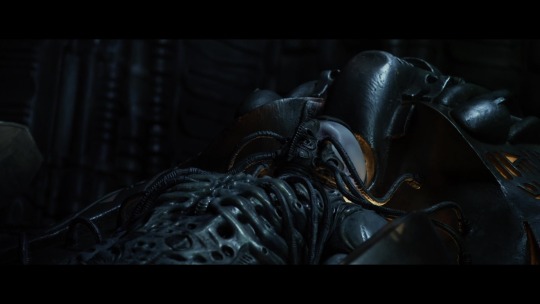
You’ll probably want to make sure to take the “kill humanity” button away from them too, that would be a good idea. And, preferably, not have exploded the head of one of their colleagues.
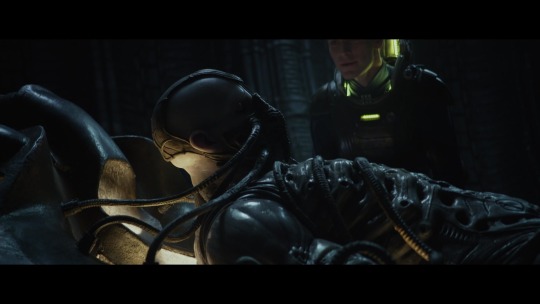
Am I describing a process that would take years? Yes. It should. This is the most important thing humanity’s ever done.

It’s been two days since the Prometheus landed.

As stated before, my faith in fictional humanity was not high in this scene.

David wakes the Engineer up. Rather than any of the measures I described above, the Engineer is met with David, Weyland, some security guys, Doctor Franenstein the head-exploder, and Shaw.

It took most of the humans a good hour or so to stop looking like death after waking up after a two year nap, and this Engineer’s been under for a thousand times longer. The poor bugger is visibly hung over and feeling sick, almost falling over on Weyland.

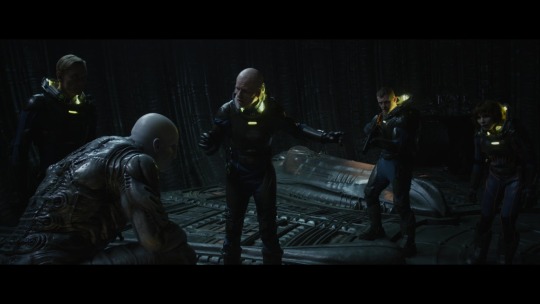
Shaw starts demanding David ask where they’re from, what’s in the ship’s cargo, why was it made for humans, all in English as Weyland tries to talk over her. They are speaking a language that only took its modern form 1600 years after the last events on this ship took place. The Engineer has zero clue what anyone’s saying.

The Engineer remains silent, and visibly disturbed by how Wayland orders his security guy to hit Shaw, which just makes the still unintelligible questions louder and less coherent.

And then David starts speaking to them.
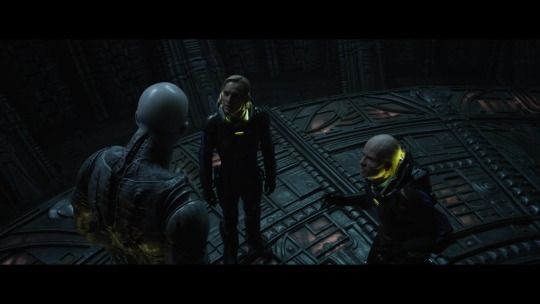
There was a short dialog between them filmed, but in the final cut, the Engineer doesn’t speak at all.
The final cut also removes Weyland’s pitch for why he should have immortality–he created life in David. David is something more perfect than human. Therefore Weyland is a god, and gods never die.

This is, as you can imagine, not convincing. It would’ve made Weyland slightly more explicable as a character, but the movie hasn’t even done that for its lead, so of course it doesn’t for Old Man Capitalism.

In the full release, David only says a few sentences. To quote Anil Biltoo, who wrote the translation:
The line that David speaks to the Engineer (which is from a longer sequence that didn’t make the final edit) is as follows: /ida hmanəm aɪ kja namṛtuh zdɛ:taha/…/ghʷɪvah-pjorn-ɪttham sas da:tṛ kredah/ A serviceable translation into English is: ‘This man is here because he does not want to die. He believes you can give him more life’.
This is–okay. In the theater, I did not know precisely what this language was. But I was making a fair imitation of the Engineer's expression in response to this, because I was pretty sure it was PIE.

Proto-Indo-European, that is. A massive swath of world languages are all traceable back to one source, though we have no records of it. Linguistic reconstruction of how they evolved from earlier roots allows us to infer a language that must have existed, and we call that the Proto-Indo-European language. PIE for short. And this is a big ol’ slice of PIE right here.
And I had a whole thing in early drafts of this post. I’d convinced myself over the years that my inexperience with PIE had led me astray in the theater. I’d convinced myself this was a PIE conlang. Meaning, I thought this was a language created for this movie that sounds like a cousin to PIE. That’s still howlingly weird, for reasons I’ll get into. But then I saw this featurette:
youtube
[Video description: A behind the scenes featurette for Prometheus entitled “Language Of The Gods”. It interviews Anil Biltoo on his work for the movie, in which he explains the concept of a proto-language, of PIE in specific, and what he did for the movie.]
It’s PIE. It’s a different reconstruction of PIE than the current standard, but it’s PIE.
And I feel vindicated, because that’s what I heard in the theater. David opened his mouth and out came PIE.

I can actually read a few words in the excerpt. I could hear them in the theater. The word /hmanəm/ is clearly meant to be a root word of “man”, which standard reconstructions indicate is the descendent of PIE *ǵʰmṓ. /Namṛtuh/ is very clearly from PIE *ne-mért, “not-die”, because anything that looks like “mort” in an indo-european language probably has something to do with death. And “/kredah/” is close to PIE *ḱréddʰh₁eti, hence Latin “crēdit”, hence modern italian “créde”, “he believes”.
PIE is just like that, sometimes. Some roots are unrecognizable, others are instantly identifiable. I’ll include my attempt at a gloss (a brief technical explanation of the meaning and grammar) at the end of the post.

The implication is that the Engineers taught their language to humans. That was Proto-Indo-European, which then spread from there. I almost started laughing in the theater at this.
In the real world, we know a few things about where PIE came from. PIE was probably spoken by people north of the Black Sea, at least five thousand years ago. This guy who’s just woken up with a hibernation hangover went to sleep three thousand years after that.
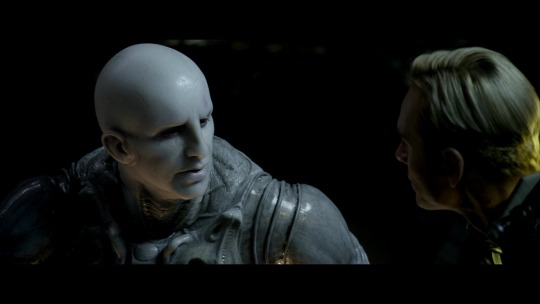
But, y’know what? Fine. Let’s say it’s a liturgical language. David’s done the equivalent of walking up to somebody and speaking to them in church Latin. Weird, but not impossible that it could be understood. Or maybe they’re just so damn long-lived and linguistically conservative that it’s more like talking to somebody in an old-timey news broadcaster voice. Still weird! But comprehensible.
But you know what we can’t possibly link back to PIE? Egyptian, Sumerian, Akkadian, Hawaiian, or the Mayan languages, most of the other ancient cultures the movie says the Engineers definitely contacted. Did all those come from the same ur-language? We don’t know. We can’t know, because our reconstruction methods are ineffective past a certain point. But if they did, then their root language had to have existed before the Bering Strait closed off the Americas from Asia, making any common ancestor at least twice as old as PIE. The movie’s implication is that it was PIE. The language of the gods is PIE. PIEngineer.
Apparently everybody who the Engineers talked to just forgot the language of the gods, save for the linguistic descendants of some nomads on the Black Sea Steppe.
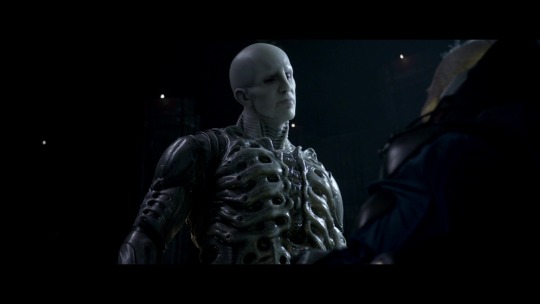
And that’s before we get into the worse implications. We can’t tie East Asian languages back to PIE. Austronesian languages. American languages. African languages. Were these people just not contacted by the Engineers? Did they forget? Did they refuse to listen?
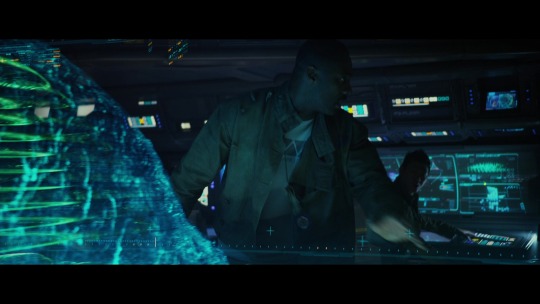
None of these are good answers! None! They’re all bad!
In Anil Biltoo’s defense, he’s an academic linguist, and, to my knowledge, not one who’s a conlanger. Ridley Scott specifically wanted to work in the oldest possible human language, and Biltoo delivered on that, based on modern scholarship. He did not make an alien language that evolved into a human language. If Scott had wanted that, David and Jesse Peterson would probably go feral for the project, but they weren’t asked. What would be the most naturalistic thing to do, if you wanted to get across the idea that humans inherited language from the Engineers?

You make a Proto-Human language. People have tried before, and others have argued their attempts are bullshit. This is one of those times that Wikipedia has a “the neutrality of this article is disputed” flag at the top of the page, because there are nerd fights everywhere on this. We don’t even know if a Proto-Human language ever existed–there could have been multiple independent origins of language–but if you’re writing fiction, sure, Proto-Human exists.
Come up with a vocabulary and grammar that could work for Proto-Human, have David speak it to the Engineer, it sounds alien to everybody, nobody gets to be the special children of the gods, and no linguistics dork in the audience will laugh at you.
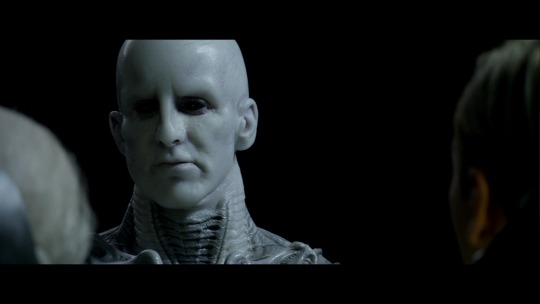
They will definitely laugh at what happens next, though.
But the post is not done! Bonus linguistic nerdery below, including a sample of my constructed language and its script.
⛬
(Previous) | (Index) | (Next)
⛬
Citations for alt-text rambles:
https://moomin.fandom.com/wiki/Stinky
https://www.deviantart.com/pretty--kittie/art/Prometheus-Engineer-407327934
https://www.uni-wuerzburg.de/en/news-and-events/news/detail/news/new-indo-european-language-discovered/
Edit: additional citations!
Movies in 15 Minutes review of Prometheus by @cleolinda, as retrieved from the Internet Archive. Hat tip to @kantama for identifying it!: https://web.archive.org/web/20120726203957/http://m15m.livejournal.com/23209.html
PIEngineer gloss
Alright, for the language nerds in the audience, I’ve put together a potential gloss, entirely based off of PIE roots available on Wiktionary and a shaky understanding of PIE verb construction:
/ida hmanəm aɪ kja namṛtuh zdɛ:taha/…/ghʷɪvah-pjorn-ɪttham sas da:tṛ kredah/ this.[singular neuter??] man.NOM [anaphoric demonstrative].1.NOM.MASC here not-die EMPHATIC/towards.3MASC.PRES(?)…life-many-[resultative or inchoative verb suffix? adjective of possession, accusative singular?] [genitive singular reflexive?] give.[middle 3S] believe.[stative(?) 3S] A more literal translation would therefore be “This man here does not (want to) approach death…he believes he (can be) given more life-having to himself.”
I am not good at figuring out suffix affixation for PIE verbs, so I probably missed or misinterpreted a few in there. I’m not sure how to break down /zdɛ:taha/ in particular, and /sas/ is a bit mysterious to me. Biltoo definitely created his own PIE reconstruction for this. Vowels are all shifted (ex *éy -> /aɪ/), there’s more palatal consonants (*ḱi-Ø -> /kja/, *polh₁-r̥-m -> pjorn), and other sound shifts I’m too scatterbrained to categorize right now.
PIEngineer to Tade Taadži translation
Alright. I previously mentioned that I have a conlang. I have yet to mention that it is distantly related to Prometheus, powered by the spiteful creative energy this movie engendered in me.
So it’s only fair I translate this passage into my language, write it in my script, and give a thorough gloss.

Jàà odormàà, hu sàà id aannãgu … midadjã kii jur kaas ʻus mogeso. /jɐː odoɾmɐː hu sɐː id aːnːãgu/ / … /midadjã kiː juɾ̥ kaːs ʔus mogeso/ This.VOC not-native-person.VOC, death.ALL not go.ATTR want.PRES. Forever.NOM give this.ALL 2S.VOC ACC 3S.NEAR.ponder.PRES.3P.FAR.ACC
Translation notes:
I am assuming David is speaking formally, clearly, and respectfully in this translation, even if one of the people he’s being respectful about is Weyland. Both Weyland and the Engineer are thus addressed using the Vocative case when first directly mentioned.
Due to the formality of the speech, formal style glyphs are also used: these require significant planning ahead of time, to identify ligatures, aesthetic considerations, and, ideally, to select a total number of words that works out to a multiple of six, as this is culturally the ideal number for a line of text.
Formal ligatures can cross glyph boundaries, and are read every time you encounter part of them in the left-to-right, top-to-bottom reading order. The most common ligatures are between grammatical markers, as in this text, but can extend to whole glyphs or even individual components of them. If one is feeling particularly artistic, aesthetic ligatures may also be joined between thematically similar glyphs.
Gendered pronouns are not used in this context. Politeness dictates that any third person pronouns be replaced with the equivalent of “this” or “that”, unless given express permission to use more informal terms of address. This is especially true when referring to non-native speakers, as they do not have an equivalent social role to the five (yes, five) genders of Taadži culture.
The word for “non-native person” used to indicate Weyland literally means “thing that has a spirit”.
Following my shaky PIEngineer gloss, I tweaked the verb in the first sentence: “to die” would normally be “hur hybà” (lit. “to stand at death”), but this has been changed to “hu iddà”, “go to death”, indicating that Weyland fears even getting near the idea.
The word for “forever”, “midadjã”, is derived from the word for 6^6, or 46,656. Tade Taadži uses a base six number system, because I felt like taking Jan Misali up on his heximal advocacy.
The normal word order for the language is SVO, but in dependent clauses it becomes OVS, just to make things harder for everyone, including me, who muttered “ah fuck” when I had to check my notes to remember where to put an allative and vocative in there. It’s after the verb, apparently.
The language has verbal person marking in some contexts, and I deliberately bent the second sentence into a more poetic mode so that I could show it off while retaining formal speech, referring to Weyland’s belief as if it’s a person. The glyphs ligate the person marker to the tense marker, Both to save space and for aesthetic purposes.
I had no word for “believe” when I started writing this sentence, so I grabbed a verb already associated with thinking during unmoving meditation to stand in for it, to get across the idea that “this is something he has thought about a lot”.
It’s a shame David’s being polite, because while I didn’t have a word for “believe”, I do have a word for “to believe despite evidence to the contrary”.
Bonus citations:
https://en.wikipedia.org/wiki/Daemon_(computing)
⛬
(Previous) | (Index) | (Next)
⛬
#Prometheus 2012#Prometheus (2012)#LANGUAGE TIME LANGUAGE TIME#also an abundance of Engineer screenshots#because I have a type and it is “hairless inhuman and affronted by the rudeness of their alarm clock”#also “doomed by the narrative” because no one in movies save for Guillermo del Toro agrees with me
55 notes
·
View notes
Text

had they not all been under such grave circumstances, this sight certainly would pull an amused smile from the spymaster of the winter court. being lost was not a new feeling for the elder fae, she had felt this way from the time she understood her mother didn't want her around, and she had no inkling to where her biological father was. she thought she found him she might have a better idea of what she's meant to do. life had sent her on a stranger path, once engaged to this lady's eldest brother, and then going off to server the winter army, and then finding herself, right where she belongs, in her high family's inner circle. she recalled when she first met lady ellie, she still remained as sweet as ever. "it takes us all time to find our purpose, but not every purpose needs to be monumental. i understand you don't wish to sit idle, you wish to do what you can to help, but i do not think you understand what you mean to your brothers. that your very existence, brings them joy that you would not imagine." she had seen a bit of the aster siblings dynamic during the time she stayed at the day court getting to know lord cedrian, it wasn't hard to notice just how much her brothers loved their little sister. truly, she envied that, lailah had wanted a family like this, brothers and sisters, so devoted to one another. "i cannot tell you what your purpose is, but for now, I would say take a moment to consider my words, think of your brothers and what it would do to them if they lost you, lady ellie. you may think you're not doing anything for them, but i'd argue otherwise."
"that was my precise thought." she murmured, the other's enthusiasm not missed by the winter fae, but she did believe it would highly benefit the day lady to perhaps keep herself occupied rather than to be too consumed in her own thoughts. "from what I could gather, the records our scholars could access could not find much. though we do suspect the queen mother and the king have been keeping alot of the records hidden." to which lailah assumed was things of the capital they don't wish to reveal to anyone else. "you are not the only one struggling with helplessness, I imagine your brothers and the rest of the high rulers and inner circles are feeling it. your enthusiasm is quite inspiring." she told the other, "there are texts that perhaps give insight to whatever this thing is, the issue is we don't know what records the royals are not allowing to see. some perhaps in the library, and some elsewhere, i imagine." she pauses, "smoke and dust, that certainly does not belong to anything of the capital...but i'm certain, you are right, whatever this is had slipped up and left us a clue somewhere.
☆゚*·゚ELLIE'S WORLD WAS very different from her older siblings. she was shielded from a lot, especially any and all things terrifying. if they could've, her brothers would've kept her from all of this. but now that she'd experienced it, ellie didn't want to go back to her regular life now. she understood that her age had a lot to do with it. and being the baby of the family, that was even more of a reason to keep her protected. "i know, and i'm so thankful for them, really. they've kept me safe from so much, but sometimes, i wonder what i'm supposed to do, you know? like what's my job here? they protect the courts and work with the other courts in prythian, but am i just supposed to be cute?" she didn't want to get frustrated or show that she was angry, but now, not being able to do anything but stay there in fear, ellie worried about her future. she worried that she'd never do anything great in life for prythian. but lailah was right. there was so much they didn't know and so much that they would yet to learn. "oh this is beyond anything! even in all the stories, nothing like this has been seen, but that doesn't mean there aren't answers. somewhere, something will help us! we just need to find it!" anything that ellie might think this was, she would be completely wrong. she had no idea where or how she would find any information, but this whole experience was scary, and frightening. "i want to say the library will have information, but i know that courts have kept books from us before. there should be clues around here. there's no way that anything is absolutely perfect. everyone messes up, right? did you see anything on the ground that shouldn't be there? i just want to show i can be helpful."

11 notes
·
View notes
Text
not designed for the cynical [kylux with side phasma/rey, rated T]
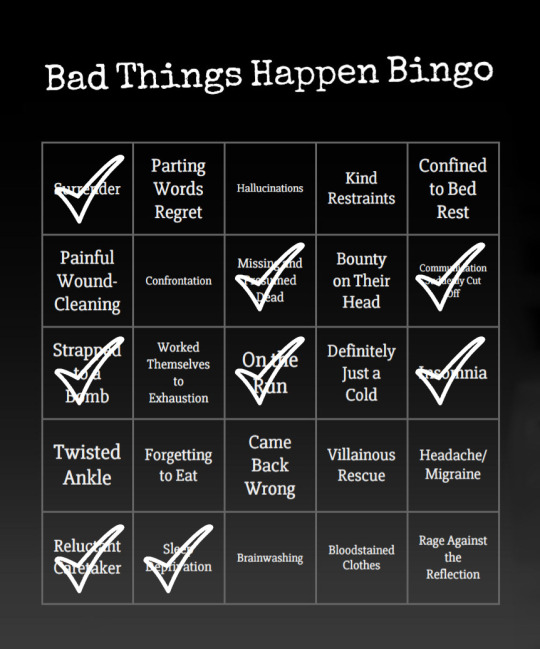
PROMPTS: communication suddenly cut off (@badthingshappenbingo, 8/25) & bed sharing - pet - delivery (@kyluxxoxo)
SUMMARY:
Whenever Snoke calls upon only Ren’s service, Hux sends word to all his relevant contacts that he’s available. The job offer he accepts turns out to be far more than he's bargained for.
(This is a low-key Inception AU that requires little to no knowledge of the movie.)
FANDOM: Star Wars Sequel Trilogy
TAGS: Alternate Universe - Modern Setting, Sharing a Bed, Mutual Pining, Alternate Universe - Inception Fusion, except not really, Armitage Hux Has Feelings, Kylo Ren and Rey Are Related
NOTES: This was written mostly during commute and/or sleep-deprived within an inch of my life and edited under the same circumstances. As such, I don't have the faintest clue what this is, but I love it.
5K || ALSO ON AO3
Hux isn’t prone to worry.
He is prone to stress, and he’s got the blood pressure to prove it—but that’s a necessity of the life they lead. It’s got its uses. Worry, however, is for when you don’t have an alphabetised, colour-coded list of plans for every situation that may arise. Worry is for the under-prepared.
Worry is a waste of time.
Knowing this doesn’t stop the fist around his heart from squeezing tight every time he hits redial and finds Ren’s phone still switched off, however.
Then again, there’s no real reason to worry about it. It’s a perfectly Ren move to go off the radar for weeks on end and turn up three countries away from where he was supposed to be, shrugging off all reprimand like he can’t understand why they’re so angry about it. It’s just what he does—he disappears, then he shows up at your doorstep when you least expect it.
He will this time, too. He promised—he will be back by Hux’s birthday.
----------------
Contrary to the popular (re: Ren’s) belief, life doesn’t stop just because Ren is off doing what Ren does somewhere else.
Even with all the safe houses and personas they maintain all across the world, the unreasonable amounts of money Snoke throws at them to be at his beck and call is more than enough to keep them afloat. Ren would be fine with not taking another independent job ever again; but Hux knows better than to rely on Snoke alone. He’s been burned enough times by fickle employers; he’s not ready to bet on the wrong horse and have to build his reputation up from scratch yet again.
That’s part of why, whenever Snoke calls upon only Ren’s service, Hux sends word to all his relevant contacts that he’s available. It keeps him in the game, on the occasion he gets an offer worth considering—and if he doesn’t, he calls it getting a feel for the market and moves on.
Monday morning finds him curled on the sofa, going through the responses on his phone. Most offers he received are below his notice like he expected, some downright insulting—and then there’s the e-mail from Enric Pryde himself.
He sits up so fast he almost knocks over his empty cup.
Among the dreamshare community, the First Order is as revered as it is despised. They reach out to very few and pay three times what they should; but the cost of failure is equally severe, growing proportionately to the project’s worth. Which seems to be a lot, in this case. While he can’t tell from the sparse details in the e-mail whether this Project Starkiller is meant to be a moving city or some sort of weapon—perhaps both, knowing the First Order—he already estimates at least two layers, more likely three, and a special blend of stabiliser for the dreamer and the architect both, who cannot be the same person for this design.
Because they want him on board as the main architect and his dreams never hold steady after the first layer, special blend or no.
Whatever he was looking for as a quick job, this is not it. It’s far more involved and challenging than he could have imagined—and, he’s finding, everything he needed. He could do this for himself. He could work a job he enjoys, instead of running point to Ren or Phasma’s picks all the time to keep them from working with incompetent point men.
Ren and Phasma, who might be working with incompetent point men halfway across the world this very moment.
No. No, he’s not thinking that. His birthday is only three days away. Everything is fine.
----------------
He e-mails back to say he’s honoured and asks for one week to get his team together. Pryde gives him five days and a thinly-veiled warning that there are others who would jump at this opportunity.
Stomach at his feet, Hux throws his phone on the coffee table and gets up to make more tea.
----------------
As expected, research gives him little of substance about the First Order’s operations and nothing at all about the Starkiller, although he finds a low-quality close-up of Pryde to glare at as he sketches out some ideas. They will get binned once he gets his hands on the self-destructing dossiers or whatever ridiculous security protocols the First Order may work with; but it keeps him busy. Better than watching the hours tick by.
When the clock turns from 11:59 to midnight on what is now Thursday, he considers texting Rey to ask if she’s heard from Phasma recently—changes his mind before he even picks up the phone. Ren wouldn’t like it. Hux has been accused of being a control freak more times than he can count as it is; he doesn’t want to add clingy to the list of his unattractive qualities.
----------------
At two in the morning, the doorbell rings.
He is going to murder Ren.
The door had never felt so close or so far as he rushes to it, heart hammering in his chest. He’s going to let Ren in, he’s going to check him for injuries and he’s going to disembowel that infuriating, thoughtless, selfish piece of shite if he’s had Hux fret all this time for no reason—
“Hi,” Rey chirps, looking up at him with damp eyes and a brittle smile. She raises a bottle of whiskey—Phasma’s favourite. “Happy birthday?”
He opens the door wider.
----------------
Admittedly—not out loud; he would never hear the end of it, from her or her cousin—Rey scores high on the short list of people whose company he enjoys. The booze helps, too. They drink in front of the television Hux hasn’t switched off in days and talk about everything but the aching holes in their chests.
She falls asleep on the sofa. He puts a blanket over her and goes to bed.
----------------
In the morning—practically afternoon, if he’s being honest—he tells her about the Starkiller. The plan was to pitch it to Ren first, to see what he thinks before bringing in the others. As it is, Ren isn’t here and none of Hux’s messages has gone through since their interrupted conversation and Hux is going to bloody explode if he doesn’t tell someone.
“I’m not sure, Armie,” she says around a spoonful of breakfast cereal he certainly didn’t buy. “He will never agree to work for the First Order.”
“Why the hell not? He works for Snoke.” Rather happily, in fact. Ren never prepares more carefully for a job than one of Snoke’s plentiful errands, no matter how simple. “Why wouldn’t he work for Snoke’s own company?”
She considers him for a long moment, chewing slowly. “He hasn’t told you the story.”
The implication—accusation—stings deep. “What story?” he demands, pushing his tea away to lean closer. The words held the intonation of capital letters, which means missing information that could potentially blindside them down the line. His respect for Ren’s private business isn’t greater than his responsibilities.
“Not mine to tell,” she says sternly, pinching her lips in disappointment like he should be ashamed to have asked to begin with. “Ask him.”
He snorts. Ren is hardly the sharing type, especially where Hux is concerned. Everything he’s ever learned about Ren has come through other means—and vice versa, he imagines.
She frowns, a question rising behind her eyes. He tenses on instinct. “Anyway,” she continues, shaking her head—and he can breathe more easily again. “My point is, if we’re doing this, we’ll need another forger.”
We. He doesn’t suppress his smile, relief coating his insides. “I suspect we won’t need a forger for this one. A chemist, on the other hand…”
----------------
She doesn’t leave and he doesn’t ask her to. They polish off the whiskey and pretend not to check their phones every ten minutes while binge-watching Star Wars, including the newest releases even their resident space nerd couldn’t finish.
He visualises Ren’s horrified expression when Hux reveals how he and Rey bonded over their shared love for big guns and hot villains in Ren’s absence. Laughter gets stuck in his throat, forming a painful lump instead.
He bids her good night and slinks away into his bedroom to stare at the ceiling.
Barely ten minutes pass before the television switches off in the next room, soft footsteps echoing lightly in the corridor. He turns his back to the door and feigns sleep as it opens and closes—which is a coward’s way, but he’s never claimed to be a particularly brave man. If he were, he would have asked Ren to stop working for Snoke instead of stewing in his misery right now.
Compared to her cousin, Rey’s weight barely shifts the mattress as she climbs in, sliding under the covers without fanfare. He shuts his eyes tighter and allows himself to imagine, just for a moment, that Ren is back.
“I haven’t heard from Phasma in over a month.”
Over a month? Hells, no wonder she sought him out. “Ren and I talked two weeks ago,” he says—realises with a sinking feeling that it sounded like he was rubbing it in. “Closer to three, actually.”
“What did he say?”
“Not much that I could understand. The reception was horrible.” Bits and pieces through constant breaking: Hux, shit, in case, person and, inexplicably, home. “I didn’t get the impression they were in danger—just inconvenienced.” As is often the case with these missions. Snoke’s got a small army of trained private security under his command and he still sends Ren to the most out-of-the-way places.
That Snoke’s hired Phasma as well for this one is a little more concerning, but not overly so. Reckless as they both can be, Ren and Phasma are forces to be reckoned with on the field—Hux would be more inclined to feel sorry for their adversaries.
Rey sighs. “Hope you’re right, Armie.”
----------------
If Mitaka is surprised to see Rey strut about in Hux’s shortest joggers she still needed to fold at the ankles and an old shirt, he politely doesn’t mention it. He and Rey exchange banal pleasantries over coffee and day-old cake while Hux finishes typing up his notes, then they get to work.
Mitaka listens to the briefing with unwavering attention, his fingers stapled in front of him like a front-row student. Like everyone else in their extended team, Mitaka is an experienced, accomplished dreamer—and yet, Hux can’t help looking at him and seeing the fresh-faced cadet Phasma had dragged in ages ago, barely into his twenties and all the more naive for it.
They’ve gotten old—Hux most so.
Once Hux finishes, “If you both are building this time,” Mitaka starts, looking between the two. “Who will be taking point? The Captain?”
Next to him, Rey inhales sharply, her face mostly hidden behind the curtain of her hair. Shame crosses through Mitaka’s face at the realised misstep.
“She’s otherwise occupied,” Hux responds before Mitaka can break into apologies. No need to make this more painful or awkward than it needs to be. “I will be running point as usual, and Rey is here to help with the heavy-lifting.”
Mitaka nods, glancing at Rey with concern before turning to Hux fully. “Where do I sign?”
----------------
They sign a heavily-encrypted stack of documents digitally, sending them through the First Order’s own communication system. The next day, they receive a link to a private cloud service with a convoluted unlock sequence that can be accessed by one device at a time, read-only.
Hux alone works on three different devices.
On the bright side, the project they receive is well-worth the inconvenience. Their objective is to design and build a superweapon out of an extensively described ice planet in the dreamspace, which must be capable of hitting five targets simultaneously and obliterating all affected life forms on them without causing a single non-predetermined casualty. Controlled chaos, if you will. The First Order wants a catastrophe they can tame and leash.
Hux can make it happen.
Whether he can make it happen in eight weeks is a different question entirely.
----------------
Without Ren to drag him away from work, he’s free to divide his waking hours between his screens and the sitting room, which they repurposed into a workshop-slash-dream den. While Hux is a decent architect in a pinch, he could never build the way Rey does—the way she bends the dreamspace to her will and creates cities that feel alive around them. Between the two of them, they have the groundwork laid out within days, quickly moving on to revising the base design according to the specifications in the main file and the numbers Hux runs.
Instead of using pre-mixed batches, Mitaka mixes their Somnacin from scratch on the kitchen table, reworking the formula per the reactions. None he comes up with works to keep Hux’s dreams steady, although a couple seem to ground his control over the dreamspace. Most just turn the dreams into nightmares for everyone involved.
Many of the nightmares are about Ren. Every time they manage to wake up from one of those, he looks at Rey to apologise. She never meets his eyes.
----------------
Unlike the two of them, Mitaka has family to return to and so he does when it gets late, leaving them to eat take-away and talk around the elephant in the room. On the rare occasion they do talk. Even though Hux gets the most shit for his workaholic tendencies, they all are guilty of it in different degrees; most nights are spent hunched over desks or tablets until they come close to shooting each other over the smallest noise or mistake, then they retire for the night.
The bedroom is where the worst fears come out.
“They might need our help,” she murmurs, lowly enough that the words could get lost among the howling wind outside. “They might be injured or—or lost, waiting for rescue. And we would be here arguing about heat transfer.”
“They aren’t.”
“But how do you know?”
He sighs loudly, turning to face Rey. Her eyes are big and eerily bright in the darkness, shining. “Look, Ren and I have been through this before. We’ve got contingencies in place for any kind of emergency—strategies to scarper and regroup as needed, fake identities with paper trail, codes to slip into lines of communication that will find their way to the other’s ear—all of which tied to systems that would alert us both if ever used. So far?” He gestures vaguely to his phones on the nightstand. “Complete radio silence.”
“Well it might be because he’s—”
His stomach lurching, “Don’t,” he bites out. He’s had enough nights contemplating that possibility himself, reasoning himself out of that line of thinking with more effort each time; he can’t handle someone else saying it.
Especially not Rey, whose unfailing optimism has seen them through many a dark spot.
“They will be back soon,” he says with conviction he forces himself to feel. They always do. This is just taking longer than expected.
Rey’s silence rings in the room.
----------------
At the end of the third week, Enric Pryde reaches out to him. His voice is as cold and serpent-like as he looks.
They talk for two and a half minutes—more accurately, Pryde relays his demands for two minutes and rebuffs Hux’s protests for the next half, then hangs up unceremoniously on him.
Fuming, Hux tries to glare a hole into his phone for about as long before going to wake Rey up.
----------------
“What do you mean, they are relocating us?”
Latching his fingers tight to keep from scraping at his already raw palms, “I mean exactly what I said,” Hux grinds out. “They want to move us into some safe house where they will provide us with everything we’ll need for the rest of the project. We don’t have the option to refuse their generosity.”
“They want to monitor us,” Mitaka says on the other end of the line, ever fond of pointing out the obvious. “Can they do that?”
“Would you like to be the one to tell them they can’t?” Hux shakes his head. They are not small fish; but the First Order is big enough to swallow them whole and not suffer for it. He knows to pick his fights. “If you’d like to drop off the face of the earth, now is the time.”
Rey snorts—as much of an answer as Mitaka’s bitter laughter.
“Well,” Rey says, scraping her chair back. “I should pack some clean underwear. When are they coming to get us?”
“As we speak.”
----------------
Before they leave, they make sure to sketch out First Order insignias on every available place. Just in case.
----------------
The safe house is, for all intents and purposes, a veritable villa in the middle of nowhere.
“A little excessive,” Mitaka comments as they tour the place, noting the bolted down furniture and darkened windows, locked conspicuously on the outside. The cupboards and the fridge are well-stocked enough to keep them fed for several months.
There is no mobile coverage.
In fact, there is no wireless connection of any sort. The multitude of devices strewn about in the house are all connected to the First Order’s own network and communications system, which provides access to every archive they might need for the project and nothing else.
The dread coiled in Hux’s guts grows heavier.
So much for his alert systems.
----------------
Progress is much faster with so much information at their fingertips.
Hux is envious of the berths of the First Order databases. Effective as his own methods of gathering intelligence are, his network couldn’t hope to have the same reach as a well-funded PMC—which he could have been a part of, had he not gone freelance instead of corporate after leaving the military.
The idea is tempting, still. He’s ruined for the civilian workforce—has been since childhood, with a father like General Brendol Hux was—but he seeks the structure and order that comes with being part of an organisation. Under different circumstances, he may have considered applying to the First Order after this project.
As their prisoner in everything but name, he wants little more than to be as far away from them as possible.
----------------
Everything they’ll need doesn’t involve a private chef or buffet, but it involves private delivery people who pick up whatever they want, no matter what they want, in a timely fashion. Because they are spiteful opportunists, they order the most extravagant and unreasonable meals they can think of. The food always arrives hot.
Hux marks the potential restaurants for each food item and how long it took to arrive on a small map every time. Just in case.
----------------
Sleeping in the same bed while Mitaka is in the next room feels too awkward, so they don’t. They don’t sleep much in general, either—not with the question of how to power a machine of the Starkiller’s scale without it overheating hanging heavy over their heads. Dreamshare mechanics are a lot more forgiving than their real-world counterparts; if they can’t pull it off down there, they sure as hell won’t make it work topside.
They have to make it work topside, they now know. The First Order wouldn’t have poured so much money and resources into what is merely Pryde’s pet design project.
“They probably have people looking into it,” Rey says, spinning her pen around her fingers with smugness dripping from her expression. He’s not petty enough to dare her to replicate it in the real world, but the thought is there. “Some super high-tech R&D division working on preventing a weapon of mass-destruction from exploding instead of, like, climate change.”
Watching her fingers like the secrets of the universe lie between them, “I don’t think so,” Mitaka responds. “It’s too much of a commitment. I bet they just wait for someone else to figure it out, then steal the designs from them.”
Something flares at the back of Hux’s mind like static, a connection he doesn’t want to make forcing itself into his awareness.
He shakes his head hard to clear it. Even with the dilation, he doesn’t have the time to dwell on things he’s got no control over.
“If you two are quite done gossiping,” he cuts in, smoothing over the blueprints in front of him for effect. “We’ve got work to do.”
----------------
We’re going to take something someone else worked very hard for, was all Ren had said the night before his departure—the only time Hux dared ask about his new job, once it became apparent Ren wasn’t going to say a word about it on his own. It’s such a non-answer that Hux couldn’t tell if Ren wanted to leave him space for plausible deniability or simply didn’t want to tell him.
He still can’t. As a matter of fact, he can’t say for sure Snoke’s job and this project are connected, either; all he’s got is a hunch.
A hunch he desperately wants to see proven wrong.
----------------
Mitaka’s newest blend is the most successful yet. They go down as far as the third level with only minor tremors under their feet—a huge leap of progress, after weeks of the ground swallowing them up whole.
Knowing better than to push their luck, they call it an early night and celebrate by ordering a feast they’ll have to take their time with. With the dinner table and every other horizontal space that could reasonably hold food covered in their work, they sprawl about the sofa set that hasn’t seen nearly enough use over their involuntary stay.
Once their food arrives and Rey realises what he ordered, a soft look crosses over her face. He ignores it. There’s only one place that serves Ren’s favourite food; it makes for a good reference point on his map. It’s not sentimental if it’s also practical.
----------------
He knew, from a logical standpoint, that having access to communication systems meant people could communicate with them and vice versa. On account of the fact that Pryde and the delivery people are the only ones to use it, he didn’t particularly care.
When the name Blysma pops up on the main screen, he realises what a gross oversight that was.
Heart at his throat, he accepts the request with shaking hands, grateful that no one is awake to see him like this. “Hux speaking.”
“Hello, Hux.”
Oh.
Oh, the ever-loving—
“Don’t say my name,” Ren adds quickly, as if he sensed that Hux was about to curse his name six ways to Sunday. “Or any other names. They don’t actively monitor your communications, but we’re pretty sure some keywords are flagged. Best not to take any chances.”
“We,” he repeats dumbly. So many questions are buzzing in his head that he doesn’t know which should take priority. “You and—ah, our mutual terrifying friend?”
Phasma’s melodic laughter rings through the other end of the line. Hux’s heart soars.
“Yeah,” Ren says, a little breathy. “Yes, we’re both here. And fine. The job ran late. Where the fuck are you?”
About that… “I don’t actually know,” he admits, the truth of it settling dark and deep into his gut. Trying to map out their location left him with more questions than answers. “Near the ocean. Far north of the city, I think; but we shouldn’t have crossed any borders.”
“That doesn’t narrow it down,” Ren says.
Irritation rising in him, “We were hardly given a tour guide for the road,” he snaps. You should have been there to take notes, is on the tip of his tongue—he swallows the words. Ren is here now, in a way. They’ve found Hux and the others. The insignias must have pointed them in the right direction; but figuring out how to contact Hux through the First Order’s own systems? That’s all their doing.
Taking a long breath to calm himself down, “How did you contact us anyway?” he asks.
“By calling in more favours than your sorry life is worth,” Phasma says, amusement lingering in her tone. He has never been happier to hear her mocking drawl. “So you had better give us something concrete to work with before we decide to leave you to rot there.”
Racking his brain, he takes a deep breath to ground himself. He’s got to focus. However Ren and Phasma managed to get into the First Order’s systems, they are unlikely to remain unnoticed for long. He needs to make the most of it.
The answer is so simple, he wants to smack himself upside the head.
“At noon, we will place an order for three servings of Bivoli tempari from the Hosnian. Track whoever is delivering it. They should lead you to us.”
----------------
He doesn’t tell the others about it. For one, he’s not fully sure his stress-addled brain didn’t make up the whole interaction—for another, they have a check-in with Pryde scheduled at 3, during which they’re going to disappoint him again with their lack of progress regarding the overheating issue. They are on thin ice as it is; he can’t take a gamble on the quality of the others’ poker faces and risk attracting Pryde’s suspicion.
At exactly noon, he contacts the delivery people and relays the order. In his periphery, Mitaka and Rey share a look.
Once he takes his seat again, “I thought the Hosnian was eat-in only,” Rey says.
Hux shrugs. “They said everything you’ll need.”
----------------
He orders something different from the Hosnian at the same time for the next four days, just in case. Mitaka is too polite to protest, despite the cuisine clearly not agreeing with him.
Rey eyes him suspiciously every time but says nothing, waiting for him to come to her instead of forcing an explanation out of him. He appreciates it more than he can put into words. He can only hope she understands.
----------------
Dying in an explosion ten times in a row tends to throw a wrench in group morale.
Unwilling to kill themselves just to wake up in the safe house, they wordlessly agree to wait out the timer. The burnout has settled deep onto their bones; Pryde’s implicit threats after every check-in don’t help their mental state, either. If Ren and Phasma hadn’t made contact, Hux might have considered taking his chances with a desperate escape attempt instead of sticking around to see what punishment the First Order would dole out for their inevitable failure. It might prove the better end, at any rate.
“I am going back to my children after this,” Mitaka says with more conviction than Hux has been able to muster up about anything in months. “I don’t care what happens. I don’t care if they kill me for it—I won’t die without seeing my family again.”
“We are not dying,” Hux reassures him. With three real-world seconds to the scheduled kick, he explains everything—Ren and Phasma making contact, the bare-bones of the plan and Blysma’s carefully vague progress update texts, the precautions they’re taking to keep Mitaka’s family safe should something go wrong.
Mitaka cries silent, happy tears at the news. Rey gives Mitaka a warm smile and pulls him close.
“That’s it,” she tells Hux, rubbing at Mitaka’s arm in sympathy. “I’m not letting her take a job without me ever again.”
Raising a brow, “You would be announcing to everyone in the community that she’s the best leverage against you,” he points out, not unkindly. He understands the sentiment—truly, he does—but it’s woefully impractical. Not to mention the kind of commitment it would take.
Her eyes gleam, smile turning secretive in that way he’s learned not to trust. Reaching into her pocket with her free hand, “I was already going to do that,” she says airily, taking out a small, velvet box.
Ah. Fair enough, then.
----------------
Hux is above lying to his employers.
Rather, he likes to think he is. Dreamshare, sophisticated as it may be at its heart, is an underground science—as such, it attracts a certain crowd. In a community where lying through one’s teeth is a survival skill, Hux knows to look someone in the eye and spin a tale truer than the truth as well as the next crook; he just prefers to tell the truth as long as it will leave his head connected to his body.
As it happens, this is the last scheduled check-in before the deadline. Giving Pryde bad news now would be signing their death warrant.
When Hux reports their success, Pryde smiles. The sight haunts Hux’s nightmares for days.
----------------
Blysma’s communication request comes the night before the grand plan, unscheduled.
His mind racing with possibilities, he grabs the tablet sitting on his nightstand before the notification wakes the others, accepting the request with, “Hux speaking.” As far as he’s concerned, there’s nothing left to talk about. Phasma has already laid out all she could of the plan without tipping off the First Order; a recap now would do more harm than good.
If this is about a last-minute change—well. Adaptability is another survival skill in their line of work.
“I missed your birthday.”
Hux blinks at the screen in his hands. “I—yes.” By a couple of months, at this stage. Where did that come from? Surely Ren didn’t realise it only now? “If you contacted me to wish me a happy belated birthday…”
“Of course not. I—uh, I called to hear your voice.” Hux’s lungs tighten, all too aware of his heartbeat. “Since we never finished our conversation.”
Their conversation. The handful of words Hux has been turning over in his head for months, to no apparent meaning or answer.
He’s bloody desperate to ask and finally, finally find out; but they’ve waited this long. They can be patient a little longer. “This is neither the time nor the place,” Hux says, as gently as he’s able, biting down on the instinctive Ren at the end. Now would be the absolute worst time for a slip-up. “Whatever it was, you can tell me tomorrow. In person.”
“That’s just it,” Ren mutters. “The last time I tried to tell you, we kept getting cut-off until signal completely went away and I thought, it’s fine. I’ll be back in a few days, I’ll just tell him then. In person.” He laughs, a breathy, bitter sound. “But then…”
But then Ren couldn’t get back until a few weeks after—and when he did, Hux wasn’t there anymore.
He clears his throat to get out the lump lodged there. “Then you’ll just have to be there this time,” he says firmly—his point man voice. “Because I will be, and I won’t accept any excuses.”
After a long beat, “Yes, sir,” Ren says, a smile in his voice. “See you on the other side.”
“Sleep well.”
#Kylux Summer Fest 2020#Bad Things Happen Bingo#kylux#Armitage Hux#Kylo Ren#Rey#Dopheld Mitaka#Phasma#Star Wars#Cai does words#finished fics#I know I say this for every fic#but this fic was a ride#I can happily go back to my KBB fic now#not designed for the cynical
21 notes
·
View notes
Text
What's the point in an electric bike? After riding one for a few weeks, I think they are the best chance of getting us out of our cars, says SIMON LAMBERT

As I sailed past the bloke on a racing bike, I felt slightly guilty. I was heading uphill on a folding bike with BMX-sized wheels and barely breaking a sweat, meanwhile my lycra-clad fellow cyclist was puffing away to travel at a far slower pace. To ease my conscience, I gently let go of the button I’d been pressing to give me a turbo boost up the hill and went back to just the standard level of assistance the electric bike was giving me. This was in pre-lockdown days and I was commuting across London to work on GoCycle’s GX – a folding electric bike that over a few weeks managed to radically change my thoughts on battery-assisted pedalling. Until March, on average, I had cycled the eight miles from my home in North London to the This is Money offices in Kensington High Street, at least four out of the five days a week I went there, all-year round, for the last 14 years. I love riding a bike. Living in London and riding to work, it was a mode of transport that was more pleasurable than the tube. In my leisure time, I do it for fun. But I’m not that serious about it. I own no lycra, I’ve never been on a club ride and I do not have the Strava app on my phone. I’d also rather drop a couple of grand on an old car than a very expensive bike. Like many more serious-minded cyclists than me, however, I was of the opinion that if you’re going to ride a bike then you should do it under your own steam - and couldn’t quite see the point of choosing a heavy, expensive electric bicycle over a normal one. Nonetheless, when GoCycle asked if I fancied trying out one of their electric bikes over a few weeks, I thought why not. I imagined that I’d use it a few times to see what it was like and then stash it away somewhere until it was time to return it - going back to riding my normal bike in the meantime. That couldn’t have been further from what happened. I absolutely loved riding that electric folding bike and pretty much used it every day. I ended up borrowing it for longer than originally planned, and even took it up to Centre Parcs, in Suffolk, travelling there after work by a combination of train and bike. After three weeks of riding it, I was genuinely sad to give it back. So, what did I love about it and why do I think electric bikes could make a huge difference to the way we get about? Firstly, it’s worth noting that a GoCycle GX should be good, because it costs £2,899. That’s a lot of money. You can buy a decent car for that, including a bargain classic that probably won't lose money. However, it is also worth noting there are quite a few serious cyclists out there who wouldn’t consider the price tag that expensive for a good bike. Yet, they would also probably look at a GX and think that they won’t get much enjoyment out of riding that. It’s a folding bike, hinging in the middle, and while it looks considerably more space age than a Brompton, it’s got that gawky long saddle post and handle bar thing going on, which doesn’t shout nimble ride. And yet, somehow, the GX handles exceptionally well and is good fun to ride. A clue to why comes from the company founder Richard Thorpe, who left a design job at McLaren Cars to start-up the e-bike firm. The GX sacrifices some of the compactness of a Brompton, with 20 inch rather than 16 inch wheels, and a bulkier frame meaning that it doesn’t fold up as small. But design elements - incuding a deliberately longer wheelbase - mean it rides much better and is just as practical. You genuinely can fold it in ten seconds, releasing one clip allowing the frame to hinge and another the handlebar stem, and then attach a small rubber strap to hold it in place. You then flip it back and wheel it along using the saddle. Put it in a train carriage and it takes up not much more room than a Brompton, and the extra space is mainly above it where nothing would be anyway. It weighs 17.4 kilograms, enough to make your serious road cyclist wince, but that's only about 3kg more than my mountain bike - and so not that heavy. Plus, you've got that 250 watt electric motor helping you along, while the easiest way to move it about is to wheel it, and it's not too heavy to pick up to get through a door or onto a train. Out on the road, the bike can be set to give you three different levels of assistance up to 15.5mph, but you must be pedalling for the power to kick in, you cannot just use the throttle to move only on electric power. That top speed for assistance and no throttle-only riding are the law for electric bikes in the UK. All GX bikes can actually run in electric mode up to 20mph, but when you register it as a UK bike that's digitally downgraded to our 15.5mph. Folding electric bike alternatives Brompton sells an electric version of its hugely popular folding bikes, with range of up to 45 miles. The Brompton Electric costs from £2,595, whereas a standard Brompton costs from £900. Decathalon sells its B'Twin Tilt 500 electric folding bike for £749. Range is up to 22 miles. Halfords sells the Carrera Crosscity folding electric bike for £999, with range of up to 30 miles. Raleigh's Evo electric folding bike has a range of up to 30 miles and 20 inch wheels and costs £1,350. There are three gears on the bike and its a decent system, although I felt I could have done with a bit further for the gearing to go when riding flat out. There is a button that boosts the assistance, as I referred to at the start of this column, and you can go faster than 15.5mph if you want under your own pedal power. The range is up to 40 miles on a charge, which takes 7 hours or 4 hours with a fast charger. I found that even using it for 16 miles a day of battery-assisted cycling, I only needed to charge once or twice during the working week. The experience is like riding along with a strong wind at your back, or being a kid with your mum or dad riding alongside with their arm behind, helping you along. You’re still cycling, it’s just a lot easier. And this is where I think e-bikes could be a game-changer. They are unlikely ever to get the serious cyclists to swap to them, but that’s not the point. The e-bike is better suited to those who wouldn’t otherwise cycle – whether because they feel the journey is too long or hard, the hill is too steep, or they can’t turn up hot and sweaty. An electric bike removes those problems. If you get a folding one, whether at the top-end from GoCycle or considerably cheaper from some other manufacturers, including Decathalon’s £750 bike, it can remove the need to drive to work or the station, get on a packed tube, or even use public transport at all. At the same time, you have the flexibility to bung it in the car boot or take it on the train if you need. One of the good things about lockdown is that it has got people out of their cars and out walking and on their bikes. I'm no longer in London - we had sold our flat and moved before lockdown began - but I've never seen this many people out on bikes on the roads and country lanes in Hertfordshire, where I've moved back to where I grew up. Friends in London tell me it's the same in the capital and bike shops around Britain are reporting booming business. It would be great if we could continue that once life returns to whatever normal will be. Combine electric bikes with some newfound confidence from Britain getting back on its bike while the roads were quiet and we could have potent combination. A standard electric bike could easily replace the short regular car journeys that you do - and there is something about that assistance that means you are much more likely to decide it won't be a hassle going on two wheels and use it instead of the car. A folding electric bike - like any folding bike - is a compromise, but as I found with the GX they can be seriously good and a very handy companion for the commuter. You are still doing exercise too, so it's good for you, just with a bit less effort than you would with a normal bike - and you can always turn off the assistance to work out properly. What's lost in the electric assistance may even be gained overall, as people are more likely to get out on their bike and do some exercise. Meanwhile, if your employer does a cycle to work scheme, you can save up to 40 per cent of the purchase price with a tax break, as we explain here. The Cycle to Work Scheme allows you to buy a bike via your employer and then pay for it via salary sacrifice, saving on your tax bill. The purchase price limit was previously £1,000, but the latest government guidance lifted this for employers who agree to go higher. Is it too great a leap of imagination for the authorities to buy strips of land through the fields, to link villages and towns with direct, safe, off-road cycling and walking routes? We also need councils and the government to play their part. Off-road routes needed to be stepped up a gear in urban areas. But too often the focus is all on that and not on linking up villages and towns, where a huge amount of day-to-day car journeys could be replaced. Is it too great a leap of imagination for the authorities to buy strips of land through the fields, to link villages and towns with direct, safe, off-road cycling and walking routes? That would make a great green transport infrastructure push for the coronavirus recovery. An electric bike is possibly the best alternative to a car for many people making journeys of up to 10 miles. We should seize the moment and encourage the switch. Click here to view original web page at www.dailymail.co.uk Read the full article
0 notes
Text
Chapter 3: The Phantom Protector of Great Britain
Fandom: Kuroshitsuji/Black Butler
Pairings: mainly Ciel Phantomhive/Elizabeth Midford
Summary: “There is nothing more ridiculous than living in a country in which an orange-skinned man won an election,” Francis had said, ending the Midfords four-year-long stay in the USA. Three days later, Elizabeth lives in gloomy London, wishing to be back in sunny LA, when a murder case suddenly turns her life upside down, entangling her with Ciel Phantomhive, his duty to the crown, and his school-intern detective agency…
Navigation: Chapter Index
“Wherever this shadowed path might lead, we were both irrevocably committed to follow it to the end.” ― Susan Kay, Phantom
London, England, United Kingdom – November 2016
She did not know when she had started to run.
A second ago, Elizabeth had witnessed a murder, and now, her feet were carrying her as far away from the crime scene as possible. And while she ran, records of what she had seen found their ways back to her mind.
The metallic smell of blood.
The murderer, stabbing and stabbing their victim even though they were long dead.
The victim’s muffled, dying screams.
There is no way that I will ever forget them, Elizabeth thought while running and running and cursing her bag with the chocolates and her bag with the bagels for not allowing her to run faster.
Eventually, despite the adrenaline pushing her body to go farther, her lungs started to burn so badly that she could only stop. Elizabeth collapsed against the wall of a building, trying to catch her breath. She had no clue where she was. She had no clue if the murderer had seen her or not. What if she had started to run without checking that first? What if they had noticed her running away and went after her?
The thought turned her blood to ice.
No, a voice in her head suddenly said – the voice belonging to the part of her head which was still sane despite everything. Someone was killed. There is a killer on the loose. You have to go to the police. You need to report this. Staying here will only decrease your chance of surviving if the murderer really followed you. You will be safe with the police.
Elizabeth pulled herself away from the wall, her legs feeling wobbly. Because her hands were shaking and she was still holding the bag with the bagels, taking out her phone proved quite difficult. If leaving the bagels wouldn’t make it easier for the killer to track her, she would have thrown the bag away ages ago. When Elizabeth had finally managed to get her mobile, she tried to dial the police’s number, but stopped herself right before clicking on “call.” What if her voice was too shaky? What if the person on the other side of the line couldn’t understand her? Was making a phone call in an unknown place while possibly being followed by a killer the best idea?
No, not here, definitely not here, her rational part said and forced her run farther to a more crowded place and into some shop.
After Elizabeth had walked through the entire shop a few times while calming herself down, she looked up the location of the closest police station.
It is only a few minutes away. Thank God, it is only a few minutes away.
And these few minutes gave her new strength to make her feet move.
***
The police station was awfully ugly. “Police” was written in capital letters over the entrance of the grey building, and a lonely London flag was fluttering miserably in the wind.
Elizabeth took a deep breath before entering the police station.
“Good evening, how can I help ya?” the policeman in charge said, looking up from what looked like a comic, and frowned. “Isn’t it a bit late for you to walk around on a school day?”
Elizabeth glimpsed at a clock and saw that it was a little after ten o’clock. When had it got so late? She had no idea.
“I,” she began, her voice hoarse and her throat dry. “I...”
“Stop stuttering, kid, and tell me what the matter is. Lost your parents? Someone stole your lolly?”
“There was a murder somewhere around here,” Elizabeth managed to say, falling into a nearby chair.
The policeman’s eyes widened. “Woah, woah, girl! You’ve seen a murder?”
Elizabeth nodded faintly. Her mind was drifting away to the crime scene, but she blinked away the image of the street painted red. Focus. “Yes. In... in Whitechapel, around Brick Lane.”
The policeman raised an eyebrow and put his hands under the counter. It was a strange movement. It had been meant to be subtle, but Elizabeth’s clouded brain still managed to catch it. She tried to analyse what he was doing, but, somehow, she did not manage to grab a clear thought.
“And you are not lying to me? Kids like you come to me all the time to prank me. Not cool. Absolutely not cool. They always prank me because they believe that Detective Inspector Marty Card is an easy victim. Can you imagine that? Can you believe that? Kids nowadays are all idiots. I am not the idiot here. Definitely not.” The policeman, Marty Card, took out a piece of paper before frowning at her. “You are not kidding me, right? Joking about murder is bad. Joking about such a murder is even worse. False information could cost me my job. Perhaps even my head. I cling to my head. I think it’s a nice head, not particularly pretty, but still nice. Has a nice shape, don’t you think?”
With her head feeling heavy, Elizabeth barely managed to nod at Marty’s words. In the alley, this one voice in her head had told her that she would feel safe with the police. But, for some reason, she did not feel secure at all. Elizabeth grabbed the rim of her skirt. Her heart was racing, her body tensed. What if the murderer knew that Marty was in charge today? If children knew when he worked, did grown-ups too? Did this one grown-up know? What if the killer had followed her and decided to get rid off her right here and now in this police station because they knew that only Marty was here? What if they murdered them both? She dug her fingers deeper into the fabric of her skirt.
“Hello? Are you listening to me, kid?” Marty’s voice snapped her back to reality.
She stared at him with wide eyes. “Hm?”
“I asked: Was that a nod for the kidding part or the head part?”
When Elizabeth didn’t reply and simply kept staring at him, he only sighed. “Not very talkative, are you? For now, I am believing you because I don’t think you are that much of an actress to fool me, Mighty Marty. So... for the protocol, what is your name?”
***
It was little after 10 pm when Ciel’s late night ice-cream eating was disturbed.
Regularly, Ciel would eat ice-cream even if it was already late. He did not even care about the fact that it was late autumn. After all, it might be cold outside, but it was quite warm inside his townhouse. Thus it was fairly reasonable to eat ice-cream even on an icy November day. Ciel especially liked it to sit next to a window on the ground floor while eating so that he could watch the passersby shuddering in the coldness while being warm and comfortable himself.
But today, he was sitting in his office, and thus, could see the tiny red lamp going on on his desk. The alarm used to make a sound too but Sebastian had once changed the ring tone from the Toccata by Johann Sebastian Bach to the cat song from The Big Bang Theory when his master hadn’t been there. Annoyed, Ciel had removed this function upon finding out about this change.
Ciel had made the alarm himself: It was connected to Scotland Yard, and every time someone pressed a certain button in one of their police stations, the small lamp lit up in his office. Next to this button, Ciel had let little, foldout, and extractable keyboards to be installed so that whoever had pressed the button could send him a short message, telling him what was going on. Then, the message would appear on a small display on the alarm cube. Another display showed the number of the police station from where the message had been sent.
He leaned forward and read the message: “S7616 – around Brick Lane, Muscle. Manor: circle. DI Right Brother.”
Ciel himself had invented the code and was quite proud of it. It had not been the easiest task to teach it to the police, though. The message, decrypted, meant:
Serial murder case: New Whitechapel Murders – around Brick Lane, now. Witness: a female. DI Marty Card.
Ciel frowned. A witness? That was strange. There had never been a witness to this case. But Ciel could not think longer about it as the message had said that the murder was happening right now. Apparently, the witness has immediately run to the next police station. Interesting. He stood up and called Sebastian.
***
Less than two minutes later, Ciel and Sebastian arrived at the scene of the crime, but the criminal was already gone. It looked like the other crime scenes which Ciel had seen in the photographs the Queen had included in her letter: The horrifyingly mangled victim was lying in a pool of blood. Her eyes were staring up at the dark sky as if she was trying to pledge Heaven for mercy. Ciel couldn’t help but to bitterly chuckle at this sight. Mercy. What a joke.
“Sebastian – search the crime scene for things which seem important or odd,” Ciel ordered.
Normally, a crime scene is secured first, then thoroughly documented by taking photographs and drawing sketches before evidence is collected. But if you have a demon butler and are the Watchdog, things work a little bit differently.
“Yes, Mylord,” Sebastian replied, his eyes glowing bright red, and began to work.
“What now, Young Master?” the butler asked a few minutes later, closing the last plastic bag.
“That someone witnessed the murder is bad enough,” Ciel meant, walking back and forth. “We cannot allow anyone else to see the crime scene again.”
“And what do you suggest, Mylord?”
“You need to restore the street’s appearance before the murder took place. Like that, this case will stay the secret it has been since the first murder.” Ciel looked up at Sebastian. “Sebastian – I order you to restore the street’s appearance, and when you’re done to bring me to Marty Card’s police station. There is someone we need to speak.”
***
“Come to think of it, Lizzy, you were not hallucinating, were you?”
After Elizabeth had calmed herself by slowly and deeply breathing in and out and after Marty had given her cup by cup of tea, she had been somehow able to answer Marty’s questions – told him her name and contact data and all she knew about the crime – even if she could only vaguely remember what had happened.
At which time did you see the murder? I am not sure. I think sometime after nine o’clock.
What did the murderer look like? I can’t remember.
Did he have a weapon? No. Wait... yes. A knife. The killer had a knife.
Eventually, Marty had decided that saying “Miss Midford” all the time was too troublesome and started to call her “Lizzy” instead without her permission.
“I am only asking because I’ve noticed that your backpack is full of chocolate and that you have a plastic bag full of Rainbow Bagels. Too much sugar can do strange things to some people, you know? Some become hyperactive, some start hallucinating. Could also be that I am mixing this up with some other white substance, though.” Marty shrugged. “Nevertheless, can I have some? I am starving. The others went home early, leaving me with all the work. Can you believe that? They work for the police, justice and righteousness and all, and then they leave their coworker to do everything! Didn’t have time to grab something to eat. Could be that I started doodling food on the documents I had to fill out.”
Elizabeth threw him a Rainbow Bagel. It nearly fell to the ground because she didn’t have the strength anymore to throw it properly. His hunger, apparently, gave Marty the power to dive headlong over the counter and catch the bagel a centimetre over the ground with the grace and elegance of a drunk cat.
“Caught it!” he happily exclaimed before returning to his original position behind the counter. “Never thought that I am so sporty, right?” Marty ate the bagel like a savage. “Oh, Heavenly Rainbow Bagel! Without you, I would have died of hunger. You coming here was truly a gift of Heaven, Lizzy! When we forget the murder part, though.”
“When do you think my parents will come?” Elizabeth asked him. She felt tired, and her brain kept repeating the screams of the victim again and again. She wanted to go home. She wanted to be with her parents and brother. She wanted to go to sleep and wake up tomorrow and find out that all of this had been a mad, mad dream. What were the odds to witness a murder on your first day of school?
“I didn’t notify them,” Marty said, licking the bagel crumbs from his fingers.
Elizabeth blinked at him, the fog over her mind suddenly lifted. “What?”
“That means ‘Excuse me,’” he corrected her. “Also, if I had called them, they would have come to see and get their baby duck – Babies of a duck are called ‘ducklings,’ right? Like in The Ugly Duckling; to see and get their duckling then. However, I cannot allow that. Someone high-up will want to talk to you. And if I mean ‘high-up’ I mean ‘scarily high-up.’ He can do things no other citizens of Britain can. Cannot afford to enrage this guy. Like I’ve said, I cling to my head. And I know what you’re thinking ‘It’s the 21st century, and we are in a civilised country, nobody gets executed and incapacitated here!’ But I have to tell you otherwise: He has the power to wander outside of law, he does not care if we are still in the 21st century and that I have a nice head I cling to.”
“Who is this ‘scarily high-up’ person?” Elizabeth wanted to know.
“‘The Phantom Protector of Great Britain’!” Marty theatrically said, spreading his arms. “His work and existence are one of the best-kept secrets in the entire United Kingdom. And I am one of the secret keepers. It’s such an honour!”
“Which you have just told me.”
“Excuse me?” he blinked at her.
“‘His work and existence is one of the best kept secrets in the entire United Kingdom.’ And you have just told me about him.”
Marty immediately turned very, very pale. “Oh God, what have I done? I will be killed for sure. Beheaded like this dumb queen with her pimped out dress and white, stinky wig –”
“Marie Antoinette.”
“– Mary Anton!” he continued in a scream.
Then, to Marty’s horror, the door to the police station opened. He shrieked and jumped out of his chair. Elizabeth’s body temperature increased – What if it’s the killer? she thought between two raced heartbeats –, and she craned her head to see who had entered the station. And as soon as she saw who had come, her body temperature promptly dropped – her initial, unreasonable fear – Marty had told her that someone was coming after all – being replaced by cold disbelief.
Only a few metres away from her stood a person she knew. A person who had just turned around and whose eyes widened at the sight of her just like her own did.
Cute Shortie.
***
Ten minutes later, Elizabeth Midford was sitting in the back seat of a Bentley. A 1954er R-type continental. One of the only 208 which had ever been created, instinctively crossed her mind. Growing up with an older brother and a father with a deep love for old and rare things, especially cars, had left marks on her. Furthermore, ever since she had been a child, facts and numbers had a comforting effect on her. And now, it helped her to keep her mind from drifting away again.
King Henry VIII never slept without an axe beside him.
Two-thirds of the world’s population has never seen snow.
The first three digits of pi are 3.14. Backwards, these numbers spell “pie.”
Four is considered to be an unlucky number in some Asian countries as their names for “four” sound similar to their words for “death.”
In Thailand, “five” is pronounced as “ha.” 555 would be “ha ha ha.”
The national anthem of Greece consists of 158 stanzas, but, normally, only the first two are sung.
The tradition to buy a white dress which is specially made and worn for and on your wedding started with Queen Victoria in 1840. Before that, women wore dresses to their weddings which they could wear afterwards too. Also, these dresses could be of any colour.
People suffering from Capgras delusion believe that someone close to them, for example a good friend or family members, was replaced by a doppelganger.
One year after the tragedy of the Titanic, the International Ice Patrol came into existence. Its purpose is to warn ships of icebergs.
Even though Buddhism originates from India, only around one percent of Indians are Buddhists. Most of them are Hindus.
Ciel Phantomhive is the “Phantom Protector of Great Britain.”
Half an hour later, the Bentley stopped, and Ciel’s butler, a tall man with black hair and peculiar eyes, opened the door for Elizabeth. She left her bags inside the car, and the butler helped her to get out. The instance she saw where they were, her eyes widened.
Why did they bring me to school?
Quietly, Elizabeth followed Ciel and his butler to Blue House, and the butler opened a door for them which said “McMillan & Phantomhive Detective Agency – Chocolate for Investigating.” Ciel entered the room and sat down behind a large desk, and as soon as Elizabeth had stepped through the door too, the butler closed it behind her, leaving the two of them alone.
As weak as a kitten, Elizabeth fell onto a sofa. The entire day had been awfully draining. First, she had been late to school. Then, she had lost her diary and became witness to murder. Now, she was sitting inside a Detective Agency at her school with the ominous “Phantom Protector of Great Britain” opposite from her – who had turned out to be the boy she had run into this very morning.
“I thought that it would be better if we could talk in a calm environment,” Ciel started, turning on a table lamp which was barely able to illuminate the room. “The police station is rather... loud with Card in charge.” He leaned back. “Let me introduce me first: My name is Ciel Phantomhive, the Earl of Phantomhive – but I guess that you have already known that.”
Blood rushed into Elizabeth’s cheeks, and she was thankful for the dim light. “I am Elizabeth Midford.”
She could faintly see Ciel raising one of his eyebrows. “Midford? Like in Marquess Alexis Leon Midford?”
Elizabeth nodded. “Yes. I am his daughter.”
“I see.”
Ciel wanted to continue, but a question suddenly blurted out of Elizabeth and cut him off: “How come you are ‘The Phantom Protector of Great Britain’?”
He blinked at her. “Excuse me?”
Elizabeth’s cheeks turned bright red. “That’s what Marty Card called you,” she mumbled.
“Card?” She could hear Ciel chuckle. “Nobody calls me that.”
Elizabeth looked up, and Ciel continued: “But that is, more or less, a description of what I am and what I do.” Ciel’s next words froze the blood in her veins.
“I am the Watchdog of the Queen – the secret executive organ, the private detective, and private assassin of Her Majesty the Queen Elizabeth the Second.
“I am the detective in charge of this murder case; and, unfortunately, you, Lady Midford, have to work with me now.”
#the stars of the night#the whitechapel copycat arc#elizabeth midford#ciel x lizzy#ciel phantomhive#cielizzy#kuroshitsuji#black butler#modern au#fanfiction#school au#this chapter was hard to write
11 notes
·
View notes
Text
For LGBTQ+ people in Mongolia, stigma is a fact of life
New Post has been published on http://khalilhumam.com/for-lgbtq-people-in-mongolia-stigma-is-a-fact-of-life/
For LGBTQ+ people in Mongolia, stigma is a fact of life
Erdene shares her story of coming out in Mongolia
A rainbow flag outside the Great Khural, Mongolia's parliament building, Ulaanbaatar, March 2019. Photo (c): The LGBT Centre Mongolia. Used with permission.
During the summer of 2017, I spent some months in Ulaanbaatar, Mongolia’s capital city. There, I met a young woman in her second year of university, who told me about the difficulties of being an LGBTQ+ person in the country. I was immediately struck by the gravity of some of the situations she portrayed. Although she was only 19 years old, she had already faced such discrimination herself. I knew that she would have valuable insight into what younger members of the country's LGBTQ+ community were going through.
Mongolia is a country with a history of discrimination against LGBTQ+ people. Even though laws exist to protect them, it is not uncommon to read reports of bisexual and homosexual people who have been beaten, raped, or even kidnapped by hate groups. There are some cautious signs of change. At the end of last year, police brought charges against a far-right group after an attack on a transgender sex worker, in a rare case of the authorities investigating an anti-LGBTQ+ hate crime.
So when I suggested that I interview her, she responded that she had to think about it. She was scared that having her name out could put her and her relatives in danger, she said. Eventually, she accepted: the silence had to be broken. She just had two requests: that I would conceal her real identity, and that I would let some time pass before publishing her words.
In 2020, we decided that three years were a period long enough. And to honour her request regarding her identity, I decided to give her the pseudonym of Erdene, which means “jewel” in Mongolian. The interview has been edited for brevity and style.
“I had many problems related to my sexual orientation”, Erdene began.
In Mongolia, she continued, sexual discrimination doesn’t always hit you directly. “People don’t really understand when you speak about ‘sexual orientation’. If I had to tell the average Mongolian that I’m bisexual, they would be like: ‘Oh… Ok’. They wouldn’t react either positively or negatively. Because they wouldn’t understand. But if I showed it with my actions – that would make them surprised”, she continued.
Amedeo Bastiano: How would they react?
Erdene: If you are a girl and you walk hand in hand with another girl, people will just think that you two are friends. No one would suspect you’re a couple. But you would never kiss another girl in public. If you did, people might insult you and yell at you. Especially the elderly and the conservative. Most likely, somebody would approach you and make you stop.
It happened to a friend of mine. She and another girl were dating; once, they went to a park and started kissing. Two guys approached them, saying: ‘Hey, what are you doing?! You both should be kissing guys. Why are you kissing each other?’ Then they forced my friend and the other girl to stop.
People react more strongly to males. If two guys hold each other’s hands, other people would beat them up. That's not uncommon.
AB: Is there any community which provides support to LGBTQ+ people in Mongolia?
E: Yes, there is a small community, a small LGBT centre, and it’s trying to get its voice heard. I joined it. We have a pride march, a pride week and so on… But only a few people participate. Last time [in 2017], at the pride walk, there were fewer than 50 of us. There is no media coverage; almost nobody knows that such events take place. And when people don’t speak about our activities, the impact of what we do fades away quickly. Many don’t even know that an actual LGBTQ+ centre exists. The people who ‘work’ there are all volunteers. They get a very small fraction of tax money, because they are registered as a non-profit organisation.
AB: So, its volunteers are not paid by the government – or not directly. How is the LGBT centre seen by state institutions?
E: Not positively. Mongolia is officially a democracy, and as a democracy it is obliged to defend people’s rights – LGBTQ+ ones included. Our ability to have a community, to be heard, and so on. But in reality, politicians don’t like us. Regardless of their party. They don’t have any interest in protecting us. So they keep silent and hinder any possible change. The centre had to fight really hard to get the small governmental help it now receives. And that took about five years.
Sexual discrimination is a crime under Mongolian law. Harming people because of their sexual orientation or sexual identity [should] involve severe punishments. But this remains a dead letter: everyone ignores the law. If you call the police saying that you’ve been discriminated against, no one will come. And many people – many cops as well as many LGBTQ+ people – don’t even know that such a law exists.
AB: Why are people so uninformed?
E: There are many reasons. The first is the obstructionism of politics; right after come money and fear.
Lately, there have been many new young people visiting the centre. They were 16 to 18 years of age. And they all lamented that they couldn’t retrieve details about the centre anywhere.
Let’s imagine that someone gets harassed or discriminated against. That person won’t know where to turn to. It’s just impossible to find something saying: ‘If you are in a difficult situation, call this number, or go to this place’. There's not even a panel, nor a flyer. When people get harassed, they will most likely be alone, feel alone, and will have to bear their suffering in silence, without the possibility to find comfort and help. They'll probably continue to face discrimination for a long time without seeing any possibility to improve their condition.
This is because those who run the centre don’t do enough advertising. It's not their fault, though. They don’t have enough money to print things out. And on the internet, despite them having a Facebook page and all that, people are afraid of having their name associated with the centre. Members of the community don’t want to share links, send e-mails, or invite their friends to events. Because they don’t want to be discriminated against. Or discriminated against even more. Those who run the centre do what they can. They work really hard. But after all, there's only four of them. You cannot ask too much of four people who work as volunteers. The possibilities are limited.
AB: How big is the LGBT community in Mongolia?
E: Officially the community has between 300 and 500 members. But there are way more LGBTQ+ people in Mongolia. Way more. There has been a survey, and it showed around 30,000 people across the country. But even those who organised that survey know that the real number is much higher. People just don’t talk. Of all the Mongolians I directly or indirectly know, I can recall less than 10 people who fully came out, including public figures. And now that I think about it, they are all women. Not a single man admitted to be gay.
AB: Given how difficult the situation in Mongolia is for LGBTQ+ people, why did you decide to come out?
E: I made this choice because of a friend. In the past, she had a girlfriend with a masculine appearance: she looked like a guy. A gay guy, maybe. She was beaten up twice just because of how she looked.
One time was on the streets at night. The other time was at an LGBTQ+ party. Sometimes we organise parties in the city. They are private events: we prepare a list, and only members of our community who register in advance are admitted. When this girl was beaten, there were three people waiting for us outside the place where we held the party. They tried to get inside the venue, but when they approached the entrance, the bouncer told them: ‘You cannot enter. There’s an LGBT party going on’. So they decided to wait for somebody to exit. He should have said: ‘Sorry, this is a private event’, and nothing else. But he decided to be specific.
He did it on purpose. By telling those three what was going on inside the place, he facilitated the situation. If you work in security, you should be able to tell at first sight when a group of jerks wants to get into a fight, right? You don’t give them a reason. Plus, when the three guys started hitting the girl – who was a customer of the venue he was working at – he didn’t lift a finger. He wanted her to be beaten.
Those three knew she was a girl. When they started, my friend told them. They could understand that from her voice. But they didn’t care. They just wanted to beat her. They felt justified by the fact she looked like a male, so they could get violent. That made me understand what discrimination can lead to. And that awareness is why I’m open about my orientation. I am open, because nobody [else] is. Because if nobody speaks out about the situation, nobody will know. And I want people to know. I want people in this society, especially people my age, to know and to start accepting those who are different.
AB: How did the people close to you react when you opened up about your orientation?
E: I lost a few friends after saying that I am bisexual. Both male and female friends. But I’m actually happier. It’s better to have friends who accept you for what you are, than fake friends who will always be ready to turn their backs on you. My mother knows; my father doesn’t. But here in Mongolia, almost nobody tells their parents. LGBTQ+ people never speak – not even with close friends. They open up only with other members of the community.
When your parents discover your orientation, you almost always have a hard time. I have a direct example of this. I know another girl. Her parents knew she was engaged to someone of the same sex… But not because she told them. They got some clues, read a few messages… When they realised, they cut her internet connection, took her phone and her notebook, and forced her to stay home for two weeks. Then, they made her break up with her girlfriend. This is the typical situation young LGBTQ+ people go through in Mongolia.
For me, it was different. My mother studied abroad, and is a very informed, open-minded person. One time, she asked me if I was happy with the person I was dating. She probably suspected that I was seeing a girl. I said that yes, I was. The only thing she answered me was: ‘If you’re happy, do anything you want. I accept you, I love you, and will accept and love you no matter what. If you’re happy, I’m happy too’. That's extremely rare here.
My mother made me understand how big the impact of your parents can be. How important it is to have their love, how much they can influence your happiness. If it wasn’t for her, I would have felt much more alone and isolated.
AB: Do you think there’s any chance for the situation to improve, in the future?
E: In Mongolia, plenty of people still think that homosexuality is a mental illness. When they find out that someone is gay or lesbian, they are disgusted, and will look for a way to cure the person.
Sometimes, Western people see being bisexual as better than being being lesbian, because you still ‘like the opposite sex’. But here, it’s more the fact that you’re attracted by the same one. People think that if you’re not 100 percent straight, you’re not able to feel love like ‘normal people’. They don’t believe you are able to have regular emotions, control over your sexuality, or a normal relationship. They think you cannot by any means be faithful.
The situation is getting better. The number of subscriptions to the LGBTQ+ centre is rising, especially among young people. We’re getting more visibility, and some foreign [LGBTQ+] centres are promoting our image abroad. Moreover, many Mongolians are now moving to other countries to study or work, and there, they can embrace a more tolerant point of view, like my mother.
But changes need time. That's why I want to leave: I’m proud of being Mongolian, but I cannot constantly be crushed by the hatred of my society.
Editor's note: The LGBT Centre Mongolia was not involved in the production of this article
Written by Amedeo Bastiano · comments (0) Donate · Share this: twitter facebook reddit
0 notes
Text
Dear Philippines,
where should I start? It’s been a rough and bumpy year for the two of us. A whole lot of new experiences, heat, realizations about this world, cockroaches, rice, conversations and bliss. When I tell people I went to live in the Philippines for one year, they associate dreamy beaches, nice weather and colorful fruit – holiday mainly:


Then they sigh and say: lucky you! An it’s true, I am very lucky. Not only because I got to see those paradise like places, but because of so much more you have to offer. What most people cannot imagine though, is that most of the time I spent with you, I spent in dirt, in traffic, hunting cockroaches and rats or in front of my fire place.
ARRIVING
Your first lesson for me was to learn how to live from day to day. It was a jump in at the deep end, because there was no way I could continue my efficient, planning lifestyle with out a fridge or even a water boiler. I would go to the market everyday to buy food and charcoal. It is impossible to conserve food because of the heat on the one hand and insects on the other hand. Aunts would somehow always find their way into my plastic boxes. There’s nothing I can do about it. It didn’t take long until I was like: grit your teeth and get to it, and thought of it as extra protein. Lesson number 2 you taught me: some things are out of my control.
“God grant me the serenity to accept the things I cannot change, the courage to change the things I can, and the wisdom to know the difference.” (Reinhold Niebuhr)
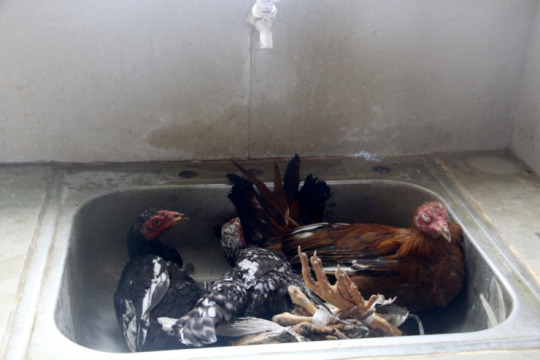
SURVIVING
The whole insect issue was not really a problem for me. I mean it’s not that I like cockroaches or rats but whatever I do, they’ll always be there. What bothered me more were the thousands of mosquitos. Especially during rainy season I tried hard not to be bidden too often, because I was worried to get Dengue fever. But again it is hopeless, they’ll bite anyway. And in the end it makes sense to ask whether it’s healthier to use Off lotion, which is forbidden to be sold in the EU and is probably carcinogenic, all day long.
UNDERSTANDING
My little sensitivities gave me a hard time in the beginning, but when I started to understand what bothers you all day long, it was worse. I hate to see you broken and weak like this. Manila bursting at the seams, so that you’re people live under the worst circumstances in basically any possible place, even a cemetery (whole article). I hate to have you admiring me for nothing but a huge bit of luck. I hate to know the truth about your missed but earning loved ones, who live abroad in Dubai or Lebanon. And I hate that I don’t have a clue of how to change any of it. On top of all that, the realization that most of your sorrows originate from colonialism. That makes those who you look up to, those who have put you in this situation in the first place.

Several relicts of Spanish colonialism can be found in Iloilo City

QUESTIONING
I love and I hate how you sometimes don’t care. The first example that comes to my mind is that huge ship in the port of Iloilo. It’s been laying there for months now and nobody seems to know what has happened to it. But even if it’s completely broken, everything would be more profitable than leaving it there. Oh well, the ship made me laugh every time but in truth it’s very sad. How are you supposed to grow/evolve when you’re not aware of your resources and capabilities?

GETTING MAD
This leads me to my favorite topic of anger: the rubbish situation. This is the one thing I cannot make you responsible for, yet cannot forgive you. I know you have bigger fish to fry. I just wish you would rudimentarily be aware of what an extraordinary beautiful ecosystem your islands are. Or at least for your own health, stop burning rubbish. I tried my best, but the war against plastic bags is a Sisyphean challenge. I pray that it won’t be too late.

PUZZELING OVER
Not to begin with the mischiefs in your politics. It would be a lie to say nothing’s in progress in your country. Economical growth is happening in your capital, but the provinces don’t profit. It’s no wonder when local politics have been under the power of one family for decades. I had to realize that one can be dumb without end, as long as there’s money one can always have a career in politics. The whole situation is screaming for change, but how is it to be done? All I know is Duterte cannot be it. I never understood your admiration/the ignorance of what’s happening.
Did somebody say corruption? This makes me think of an anecdote that once happened to me when I wanted to withdraw money. “‘My request could not be processed’, why is that?” I asked the bank’s security guard and he answered with out looking up: “Because of power and corruption…”. The only time I ever got in touch with this stuff was at the immigration office I think. One of my all time favorite places… not. Every time I went there, the prices for my visa extension were different. It sounds funny but it made me angry to pay ridiculous extra fees like “express lane” that change nothing. But again, there’s nothing I can do about it.


NOT UNDERSTANDING
Your superstitions make me laugh and angry at the same time. How can you seriously believe in spirits, trolls and fairies? How can you be in bondage like that? And where I never got behind: how does all of this fall in line with christianity?
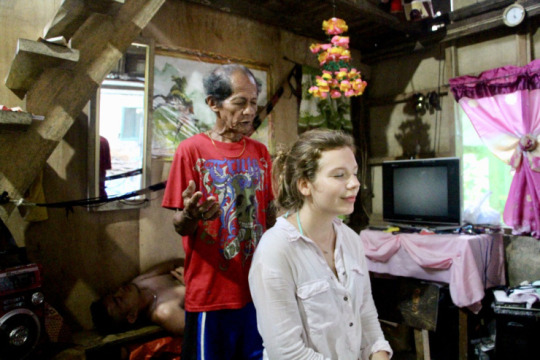
Visiting a healer on the supposedly enchanted island of Siquijor (full article)
EXPERIENCING
Speaking of your faith: you amazed me. Coming from the least religious place on earth, Eastern Germany, I couldn’t believe how so many – no actually all of you – believe. I have to say you live a strange version of Christianity. From horror stories of people who are voluntarily crucified during easter to celebrations of events that didn’t even happen according to the bible (some islands celebrate the reunion of Jesus and his mother after he was resurrected). Even though I’m convinced that a great part has never ever read a single page of the bible, it was a pleasure to see and feel your spirituality. I found it an interesting experience also regarding my own faith.
CELEBRATING
They call you an americanized piece of Spain, with no culture except what emperors of the past centuries have left with you. But good god, you know how to celebrate fiesta! And even if there’s Lechon (pigling) for every single occasion it doesn’t matter. These events are your own. Even if I can barely finish one plate of food by courtesy, I would always go, because this is you in a nutshell. Fiesta means family, food, hospitality, karaoke, more food and Lechon obviously. I was blown away by Dinagyang festival in January. As much as I hated the beauty contest, I loved the tribe performances.



On your thousands of islands the party never stops. As much as I regretted every night club visit in Iloilo, I wish back to all the fun nights in Smallville (night life district of Iloilo) or your cozy beach bars. I mean, what kind of world is it, where rum is cheaper than coke? It was a hell of a New Years Eve in Boracay last year – salamat gid Bryan.

One year wearing slippers and the shittiest clothes, like grandma-style maxi skirts. It didn’t matter at all, because I would still be “Miss beautiful” for you. And to speak the whole truth: All of them mold anyway.

Among the things I miss the most, your Jeepneys definitely make the top 3. Regardless if in the front, in the back, on the roof, with chicken between my feet or a 100 year old lollo (grandpa) on my lap – I love riding a jeepney! Jeepneys are a lifestyle. Even though they’re super loud and probably the main polluters, they will always have a special place in my heart. 🙂

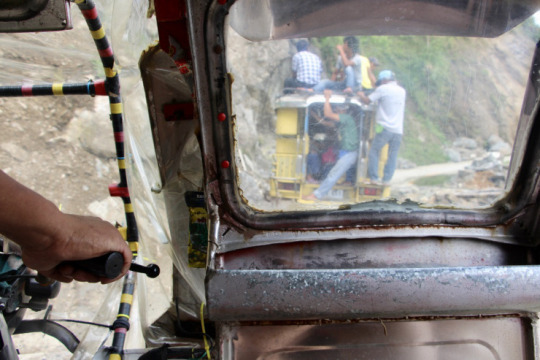
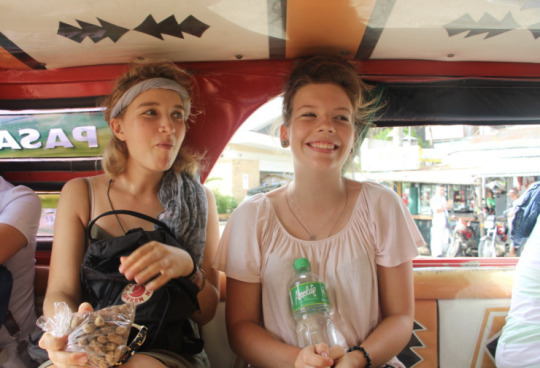
EATING
Unfortunately I cannot say the same about your food. To summarize this long story of suffering, I’ll just say: you stay under your possibilities. With out doubt the best you have to offer is your fruit. I love all of them and they outclass everything my german super markt offers.

As the good filipina I am, I love rice a lot even though I gained a lot of weight because of it…

I would like to take the opportunity to pick the grossest and yummiest you have to offer. Basically I’m a huge fan of your vegetarian dishes like fried eggplant, bitter melon or munggo. Furthermore I would never turn down a sweet sin like a fresh halo halo, banana cue or bibingka.
But as much as I’d like to, I have no understanding why and how you can enjoy a boiled developing duck embryo (balut), boiled pig blood, duck feet or pig intestines. I am more than sure that I ate my lifetime ration of dried and later fried fish. There’s only one question left unanswered: How can you call this buko (coconut) salad?


TRAVELING
Oh Philippines, you have so much to offer. I will never forget the amazing memories I made when traveling from island to island, discovering your hidden gems. It’s hard to realize though that most of my friends from Iloilo won’t ever be able to see all this.
From the 8th world wonder: the Rice Terraces of Batad

to the Chocolate Hills and tarsiers of Bohol
to swimming with whale sharks and chasing waterfalls in Cebu

to diving in Apo Island and Coron
to island hopping and beaching in Siquijor and Palawan

As off-hook as it sounds, but during the course of visiting all those amazing places, one becomes kind of choosy. One natural wonder trumps the other and in the end it’s the quit and raw places that fascinate the most. I’m in love with all your unpopular paradises left for me to explore, unlike other southeastasian countries.




Iloilo city, you little piece of dirt. Filipinos call you City of Love but I’m afraid you cannot compete with Paris – the “other” city of love -, to be completely honest with you. Quite the opposite, you are kind of the only place that turned out a lot less – or rather not at all – beautiful, looking back. You’re importance is founded on your inhabitants, food places and open air concerts or art galleries you hold. Other than that you actualize the shady sides of urbanization. Among those firstly your terrible pollution, the dirt and waste in general; poverty and slums; waifs, adults throughout the day and drunk at night – to name a few. I’m glad I didn’t live here permanently, but I certainly enjoyed the big city life experience during the weekends. How special is though, to have my buko (coconut) juice lady of trust in a city on the other side of the world?




Guimaras my love, you are literally what I call paradise. I love you for much more than your mangoes, even though I love them a lot already. [Background information: Guimaras is the neighbouring island of Panay that is said to have the sweetest mangos in the world (full article). Once a year they hold a mango festival to worship them. Read about my mango-all-you-can-eat experience here.] You are a green wonderland, much needed escape, clean air, you are an untouched beauty. Stay the way you are please.



Thank you Philippines, for paving me the way to find eternal piece with me, myself and I and a hammock. The truth lies in the fact that one doesn’t need more than that. With this, a whole different style of traveling opened up to me. I reckon this is your most precious gift to me. I would NEVER have had the courage to hitchhike!


Yes it has a mosquito net! A local friend of mine invented them when traveling his country. They are manufactured by local women in Palawan. Get yours here

And like it is probably anywhere in the world: there are plenty of acquaintances and a precious hand full of friends. I am so thankful for every minute.
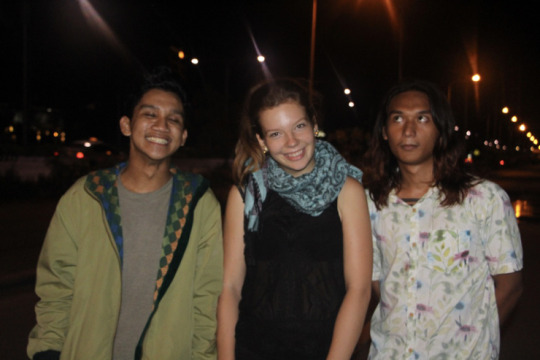
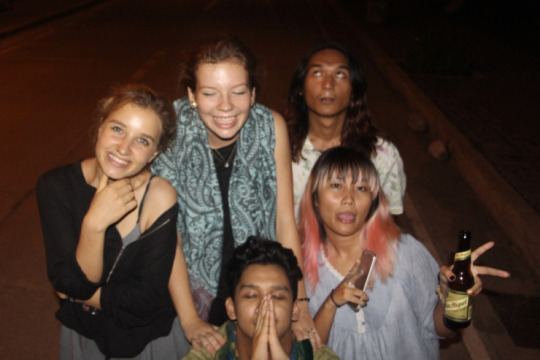
And of course salamat gid to my SOS family. There are obviously no words. You guys know already.
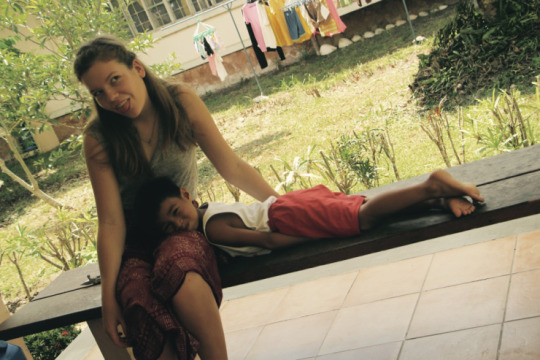
LEAVING
It felt weird and rash to leave you, when there was still war going on in Mindanao. When my little village got a bomb threat. When summer had finally ended and water started to run more frequently through my faucet. But really this was the end of my endless summer. It was a time of crisis, when ISIS raged in Marawi, relatives of the local islamists suddenly showed up at the port of Iloilo. When the NPA decided the time had come to take action again and raided the police station of our neighboring village Maasin. And all along I updated myself using foreign media. I didn’t want to feel unsafe on your streets at night, but how was I not to, when nobody had a clue what was going on? Even though I was expecting our foreign office to withdraw us german volunteers any minute for the last couple of weeks, my return flight came earlier than expected. It was hectic, it was emotional and sudden.

COMING BACK
What I take along with me to “real life” is sadly less than I planned on. That’s how it always goes. Never underestimate the power of habits. But what I keep with me every day is the filipino point of view. Every time I walk the streets, my university or the super market. I cannot help but wonder what a filipino would think right now.
Sex tourism to me, is one of the worst felonies of mankind. The whole problem gets to me on a very personal level, when I see that the perpetrators live right here. Make it stop!

Even if I could, I wouldn’t change a single thing about our year together. Mahal kita, and: nahidlaw ako gid sa imyo ❤


PS: Again I cannot help but recommend again everybody to watch this really close up documentary. And this little video by my fellow volunteer Gwen: It is so accurate, it bursted me to tears 🙂
Filipina for one year Dear Philippines, where should I start? It's been a rough and bumpy year for the two of us.
#asia#backpacking#gapyear#hammock#itsmorefuninthephilippines#neverstopexploring#philippines#travel#travelblogger#travelphotography#volunteer#wanderlust
0 notes
Link
Bill Rose. Photo courtesy of UM Communications
By Bill Rose. This story has been reprinted form the upcoming issue of Meek School Magazine with the permission of the Meek School of Journalism.
REFLECTIONS ON THE JOY OF INSPIRING STUDENTS IN THE CLASSROOM AND THE LARGER LESSONS IN LIFE
When I retired from the news business after 42 years, God set me up with a dream job teaching journalism at the University of Mississippi.
I know God was behind it because every day for eight years I have gone to work in Heaven.
Now I am 70 and in January, for the third time in my life, I plan to retire. It’s time. And this time it will be for good. I swear. Really.
Still, I will miss it.
A big part of it is the sheer beauty of the place. It’s hard to walk beneath the giant, leafy oaks of the Grove, cooled by the shade, luxuriating in that soft green grass, inhaling the sweet seductive smell of the place without wondering if this is awfully close to what God was up to in the Garden of Eden.
All those trees and shrubs and flowering plants, all that green, have an instant calming effect. Remember, universities are places full of insecure people and more self-inflicted tension that you could imagine. I really believe the beauty of these surroundings, especially the Grove, is what allows this driven place to breathe. In fact, its very presence breathes for us. If you doubt me, take a good look at the classes that flock there in the spring, students and professors alike struggling to keep their eyes open as nature whispers to them, a balm for the soul. Peek at the benches scattered through the trees and you’ll find solitary folks — professor and student alike — taking a break, communing with nature, relaxing before plunging anew into the maelstrom.
But I will miss engaging some of the university’s brightest, most ambitious students in my magazine class, miss those “Aha!” moments when the light suddenly comes on in their eyes and they figure out how to make words sing, how to use the sounds of words to slow down a story or make it read faster, to finally break the shackles of the concrete and begin to use the abstract to pound home a crucial point.
I really believe it’s all about the students. I consider the students a sacred trust. It’s my job to not just impart information but to help them in any way I can. I have spent hours with individual students going over their stories and telling them how to make them better, what they have done right and, yes, what they have done wrong. They are tender young souls on a journey and they are looking to us for wisdom. We owe them our time, our knowledge, our hearts.
Without becoming schmaltzy and emotional, I cannot begin to describe how powerfully it affects me when they give me their hearts in return. I promise you, it is not money that kept me here for eight years. It is that feeling I get when they return after the course to thank me yet again or to continue to seek advice on their lives. Their challenge when they arrive at Ole Miss to confront the future is so great that we owe them every bit of magic, every scintilla of time we can possibly muster.
It’s not easy, of course. Writing is personal, perilous business, bruising and sometimes fatal to the ego. The high schools of Mississippi and, yes, even the University of Mississippi, neglected writing instruction for decades and this generation is paying a price for it. So, helping students figure out they could really do it if they thought about it is what has kept me going. I felt like it was an almost holy cause, no matter how ham-handed I might be sometimes in the instruction.
My class, Depth Reporting, has produced eight in-depth magazines in its eight years, exploring Delta poverty, Delta food and obesity, lessons that can be learned from a record Mississippi River flood, Mississippi’s Indian tribes and more. Each class started off in what can only be described as a hopeless state of puzzlement and despair. But at some point, they got it. The lights came on. In some cases, they came on brightly enough to win national awards, producing the best college magazine journalism in America.
Farley Hall, home of the Meek School of Journalism and New Media. Photo by Steven Gagliano
A very special moment came when they won two Robert F. Kennedy Journalism Awards and our students were called onto a podium in the nation’s capital and congratulated by Ethel Kennedy, widow of the late attorney general who was involved in sending thousands of soldiers to Ole Miss after the James Meredith 1962 riot. “My, my,” Mrs. Kennedy told that first set of award winners. “It looks like a lot of things have changed for the better at Ole Miss!”
Watching the university grow and get better has been another source of happiness for me. When I was a journalism student here in 1965-69, the school had fewer than 5,000 students and was still limping along from the riot and the negative publicity and malicious political interference that accompanied it. The best professors did not want to come here. The New York Times poked fun at us with a story that talked about how some had viewed us as a campus of empty-headed scions of bankers and lawyers.
The journalism department operated on a shoestring budget out of an old wood frame house that seemed to have only three, maybe four full-time instructors and a relative handful of students. (Yet, that little department produced some of the best journalists in the land.)
Like Mrs. Kennedy, when I returned here in 2010 after all those years at The Miami Herald and The Palm Beach Post, I was amazed at how far we have come. A presidential debate. No longer just a department but a full, nationally known journalism school with nearly 1,500 students. An expanded football program and excellent athletic facilities. New construction all over an ever-growing campus. Each year, another record enrollment. Suddenly Ole Miss was being recognized for research and academics and getting better rankings nationally.
Yes, we still get really bright kids who enroll as freshmen with no clue as to how to write or why it’s even necessary. I fear for public education in this state. I fear, too, for a generation with such a short attention span, one whose members run into you on the sidewalk because they can’t pry their eyes from their iPhone text messages. But the university is starting to re-emphasize writing instruction, and I’m encouraged to see that, too.
For decades, I had to respond with a sheepish smile and defensive excuses when friends in Miami and Atlanta and New York and Washington would crack jokes about Ole Miss. “Confederate U.,” they called it.
Now I can point with pride to so many changes. We have a diverse student body and a school that at least grapples with the ever-present dilemma of race that so much of the rest of the nation foolishly tries to ignore. We have so far to go on this, but at the university, at least, we are moving forward a little at a time and doing it oh-so publicly. Ole Miss has always been under a microscope and always will be. But it looks shinier by the second.
It helps that we are cozied up next to Oxford, one of the coolest little college towns in the land.
Lafayette County Courthouse. Photo by Steven Gagliano
And yet, all of this doesn’t do justice to why I love the place. Anyone who has gone to school here should instantly understand what I mean. Ole Miss, after all, is a state of mind, a place of dreams, a place in time where young men and women of a critical age enjoy the freedom and pleasures of college life before plunging into the hectic, deadly serious fray of the workplace. It is a proving ground, a place to learn and grow, a place where young people come to grips with who they are and what they can be. The fact that this is the most beautiful campus in America and, for better or worse, one of the most social and fun-loving (think: Grove on game day) merely intensifies the experience.
Boil it all down, and I think the key ingredient is freedom. Here, you are free to learn and free to fail. Either way, you learn. And you never forget the larger lessons learned at Ole Miss.
I will be forever grateful to God and Will Norton, dean of the Meek School, for the opportunity to be here learning all over again. But of course, we all know that I’ll be back again and again and again. You can graduate from Ole Miss, you can retire from Ole Miss, but Ole Miss never graduates or retires from you.
For questions or comments email [email protected]
The post Meek School Magazine: A State of Mind, A Place of Dreams appeared first on HottyToddy.com.
0 notes
Link
Bill Rose. Photo courtesy of UM Communications
By Bill Rose. This story has been reprinted form the upcoming issue of Meek School Magazine with the permission of the Meek School of Journalism.
REFLECTIONS ON THE JOY OF INSPIRING STUDENTS IN THE CLASSROOM AND THE LARGER LESSONS IN LIFE
When I retired from the news business after 42 years, God set me up with a dream job teaching journalism at the University of Mississippi.
I know God was behind it because every day for eight years I have gone to work in Heaven.
Now I am 70 and in January, for the third time in my life, I plan to retire. It’s time. And this time it will be for good. I swear. Really.
Still, I will miss it.
A big part of it is the sheer beauty of the place. It’s hard to walk beneath the giant, leafy oaks of the Grove, cooled by the shade, luxuriating in that soft green grass, inhaling the sweet seductive smell of the place without wondering if this is awfully close to what God was up to in the Garden of Eden.
All those trees and shrubs and flowering plants, all that green, have an instant calming effect. Remember, universities are places full of insecure people and more self-inflicted tension that you could imagine. I really believe the beauty of these surroundings, especially the Grove, is what allows this driven place to breathe. In fact, its very presence breathes for us. If you doubt me, take a good look at the classes that flock there in the spring, students and professors alike struggling to keep their eyes open as nature whispers to them, a balm for the soul. Peek at the benches scattered through the trees and you’ll find solitary folks — professor and student alike — taking a break, communing with nature, relaxing before plunging anew into the maelstrom.
But I will miss engaging some of the university’s brightest, most ambitious students in my magazine class, miss those “Aha!” moments when the light suddenly comes on in their eyes and they figure out how to make words sing, how to use the sounds of words to slow down a story or make it read faster, to finally break the shackles of the concrete and begin to use the abstract to pound home a crucial point.
I really believe it’s all about the students. I consider the students a sacred trust. It’s my job to not just impart information but to help them in any way I can. I have spent hours with individual students going over their stories and telling them how to make them better, what they have done right and, yes, what they have done wrong. They are tender young souls on a journey and they are looking to us for wisdom. We owe them our time, our knowledge, our hearts.
Without becoming schmaltzy and emotional, I cannot begin to describe how powerfully it affects me when they give me their hearts in return. I promise you, it is not money that kept me here for eight years. It is that feeling I get when they return after the course to thank me yet again or to continue to seek advice on their lives. Their challenge when they arrive at Ole Miss to confront the future is so great that we owe them every bit of magic, every scintilla of time we can possibly muster.
It’s not easy, of course. Writing is personal, perilous business, bruising and sometimes fatal to the ego. The high schools of Mississippi and, yes, even the University of Mississippi, neglected writing instruction for decades and this generation is paying a price for it. So, helping students figure out they could really do it if they thought about it is what has kept me going. I felt like it was an almost holy cause, no matter how ham-handed I might be sometimes in the instruction.
My class, Depth Reporting, has produced eight in-depth magazines in its eight years, exploring Delta poverty, Delta food and obesity, lessons that can be learned from a record Mississippi River flood, Mississippi’s Indian tribes and more. Each class started off in what can only be described as a hopeless state of puzzlement and despair. But at some point, they got it. The lights came on. In some cases, they came on brightly enough to win national awards, producing the best college magazine journalism in America.
Farley Hall, home of the Meek School of Journalism and New Media. Photo by Steven Gagliano
A very special moment came when they won two Robert F. Kennedy Journalism Awards and our students were called onto a podium in the nation’s capital and congratulated by Ethel Kennedy, widow of the late attorney general who was involved in sending thousands of soldiers to Ole Miss after the James Meredith 1962 riot. “My, my,” Mrs. Kennedy told that first set of award winners. “It looks like a lot of things have changed for the better at Ole Miss!”
Watching the university grow and get better has been another source of happiness for me. When I was a journalism student here in 1965-69, the school had fewer than 5,000 students and was still limping along from the riot and the negative publicity and malicious political interference that accompanied it. The best professors did not want to come here. The New York Times poked fun at us with a story that talked about how some had viewed us as a campus of empty-headed scions of bankers and lawyers.
The journalism department operated on a shoestring budget out of an old wood frame house that seemed to have only three, maybe four full-time instructors and a relative handful of students. (Yet, that little department produced some of the best journalists in the land.)
Like Mrs. Kennedy, when I returned here in 2010 after all those years at The Miami Herald and The Palm Beach Post, I was amazed at how far we have come. A presidential debate. No longer just a department but a full, nationally known journalism school with nearly 1,500 students. An expanded football program and excellent athletic facilities. New construction all over an ever-growing campus. Each year, another record enrollment. Suddenly Ole Miss was being recognized for research and academics and getting better rankings nationally.
Yes, we still get really bright kids who enroll as freshmen with no clue as to how to write or why it’s even necessary. I fear for public education in this state. I fear, too, for a generation with such a short attention span, one whose members run into you on the sidewalk because they can’t pry their eyes from their iPhone text messages. But the university is starting to re-emphasize writing instruction, and I’m encouraged to see that, too.
For decades, I had to respond with a sheepish smile and defensive excuses when friends in Miami and Atlanta and New York and Washington would crack jokes about Ole Miss. “Confederate U.,” they called it.
Now I can point with pride to so many changes. We have a diverse student body and a school that at least grapples with the ever-present dilemma of race that so much of the rest of the nation foolishly tries to ignore. We have so far to go on this, but at the university, at least, we are moving forward a little at a time and doing it oh-so publicly. Ole Miss has always been under a microscope and always will be. But it looks shinier by the second.
It helps that we are cozied up next to Oxford, one of the coolest little college towns in the land.
Lafayette County Courthouse. Photo by Steven Gagliano
And yet, all of this doesn’t do justice to why I love the place. Anyone who has gone to school here should instantly understand what I mean. Ole Miss, after all, is a state of mind, a place of dreams, a place in time where young men and women of a critical age enjoy the freedom and pleasures of college life before plunging into the hectic, deadly serious fray of the workplace. It is a proving ground, a place to learn and grow, a place where young people come to grips with who they are and what they can be. The fact that this is the most beautiful campus in America and, for better or worse, one of the most social and fun-loving (think: Grove on game day) merely intensifies the experience.
Boil it all down, and I think the key ingredient is freedom. Here, you are free to learn and free to fail. Either way, you learn. And you never forget the larger lessons learned at Ole Miss.
I will be forever grateful to God and Will Norton, dean of the Meek School, for the opportunity to be here learning all over again. But of course, we all know that I’ll be back again and again and again. You can graduate from Ole Miss, you can retire from Ole Miss, but Ole Miss never graduates or retires from you.
For questions or comments email [email protected]
The post Meek School Magazine: A State of Mind, A Place of Dreams appeared first on HottyToddy.com.
0 notes